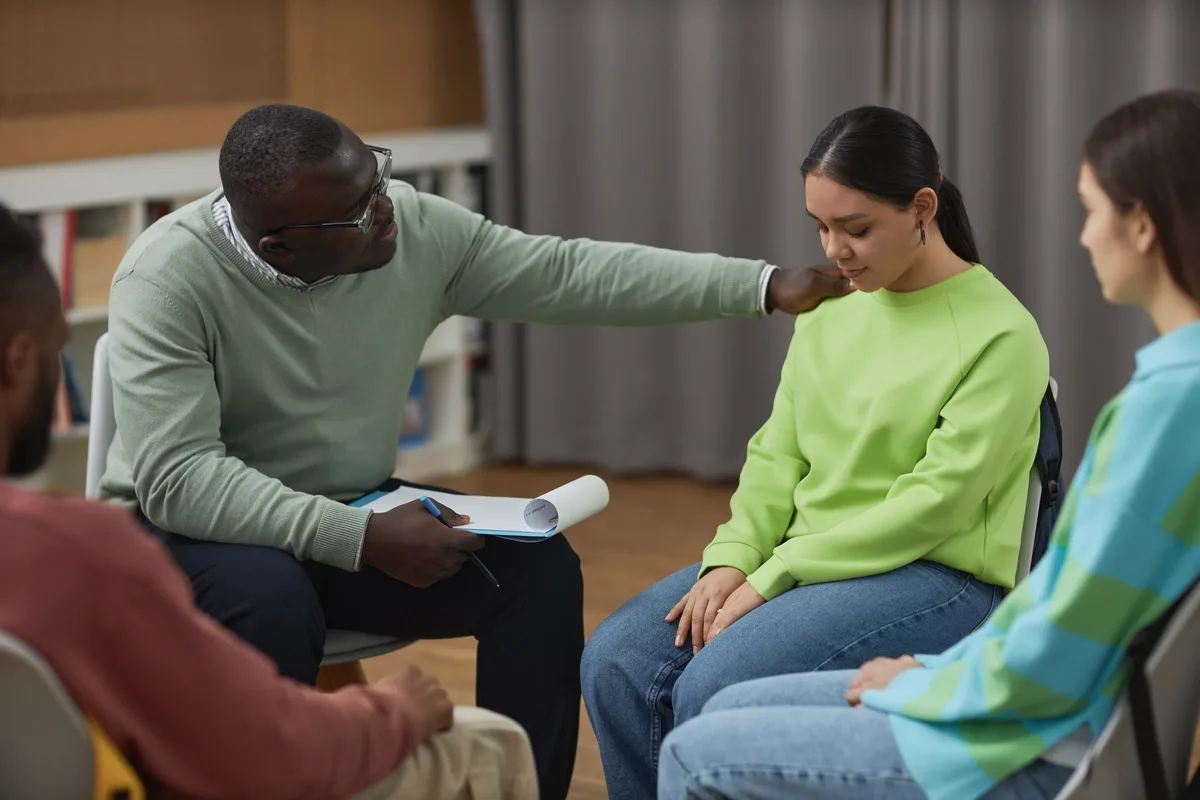24/7 Helpline:
(866) 899-111424/7 Helpline:
(866) 899-1114
Learn more about Ecstasy Detox centers in Florida
Ecstasy Detox in Other Cities

Other Insurance Options

Sutter

Ceridian

Meritain

State Farm

MHNNet Behavioral Health

WellCare Health Plans

Choice Care Network

Regence

BHS | Behavioral Health Systems

Absolute Total Care

MVP Healthcare

Oxford

American Behavioral

Holman Group

Group Health Incorporated

Access to Recovery (ATR) Voucher

Coventry Health Care

WellPoint

Magellan

Health Choice

Ambrosia Treatment Center
The Ambrosia Treatment Center is a drug and alcohol addiction treatment rehab in West Palm Beach, FL...

Tampa Bay Recovery Center
Tampa Bay Recovery Center is a private rehab located in Saint Petersburg, Florida. Tampa Bay Recover...

Allure Detox
Allure Detox is a dual diagnosis addiction treatment center in West Palm Beach, Florida. They provid...

Quantum’s Oceanside Recovery
Quantum’s Oceanside Recovery specializes in the treatment of substance abuse, including alcohol and ...

Henderson Behavioral Health – West Branch
Henderson Behavioral Health - West Branch is one of the oldest, largest and most successful provider...

Banyan Treatment Centers – Stuart
Banyan Treatment Centers – Stuart is a private rehab located in Stuart, Florida. Banyan Treatment Ce...

Morton Plant Hospital – Behavioral Health
Morton Plant Hospital- Behavioral Health, located in Clearwater, Florida, is a part of BayCare. They...

Detox of South Florida
Detox of South Florida is a substance abuse treatment center located in Okeechobee, FL. They focus o...

BayCare Behavioral Health
BayCare Behavioral Health - 7th Street offers outpatient treatment for individuals with alcohol and/...

Agape Treatment Center
Agape Treatment Center in Fort Lauderdale, FL is a co-occurring mental health and substance use diso...

New Era Health Center
New Era Health Center provides a wide array of mental health services ranging from the intensive Par...

LifeStream Behavioral Center
LifeStream Behavioral Center meets the behavioral healthcare needs of Lake and Sumter County residen...

Operation PAR
Operation PAR is a reputable dual-diagnosis addiction rehab center in Fort Myers, Florida for indivi...

The Advocate Program
The Advocate Program is a justice agency in Miami, Florida that offers an array of supportive servic...

Seacrest Recovery Center Boynton Beach
Seacrest Recovery Center Boynton Beach is a private rehab located in Boca Raton, Florida. Seacrest R...

Retreat at Palm Beach
The Retreat at Palm Beach is an accredited substance abuse treatment center in Lake Worth, FL. The c...

Saluscare – Evans Campus
Saluscare - Evans Campus, located in Fort Myers, Florida, provides mental health and alcohol and dru...

Faith Farm Ministries
Faith Farm Ministries, located in Fort Lauderdale, Florida, is an alcohol and drug rehab center focu...

River Oaks Treatment Center
River Oaks Treatment Center is an accredited dual-diagnosis rehab in Riverview, FL. With an emphasis...

Next Generation Village Teen Drug and Alcohol Rehab
Next Generation Village offers a full continuum of care for youth, ages 13-17, who are struggling wi...

Evolutions Treatment Center
Evolutions Treatment Center is an alcohol and drug addiction treatment center located in Fort Lauder...

The Villa Orlando
Pasadena Villa is a 14-bed, residential treatment facility, in which residents will live and learn f...

WhiteSands Treatment Center
WhiteSands Treatment Center is an accredited drug and alcohol rehab located in Fort Myers, FL. Throu...

Still Detox
Still Detox is a CARF accredited luxury dual diagnosis drug rehab center located in Boca Raton, FL. ...

Turning Point of Tampa
Turning Point of Tampa provides alcohol and drug rehab services to men and women seeking recovery in...

Fort Walton Beach Medical Center – Behavioral Health
Fort Walton Beach Medical Center – Behavioral Health is a drug and alcohol treatment center that sup...

Recovery First
Recovery First, situated in Hollywood, FL, stands as a dedicated drug and alcohol addiction treatmen...

Summer House Detox Center
Summer House Detox Center provides patients with a non-hospital setting recovery home. This addictio...

Zinnia Healing at Lake Okeechobee
Nestled in the tranquil settings of Florida, Zinnia Health Lake Okeechobee emerges as an addiction a...

River Region Human Services – Andy’s Place
At RRHS (River Region Human Services), individuals can find a comprehensive range of treatments and ...

Beachway Therapy Center
Beachway Therapy Center is an alcohol and drug rehab center and mental health counseling center in W...

AION Health Group
AION Recovery is a drug and alcohol rehabilitation facility that specializes in personalized care fo...

Recovery Unplugged
Recovery Unplugged is an accredited substance use treatment rehab in Fort Lauderdale, FL that combin...

JourneyPure Emerald Coast – Outpatient
If you’re looking for help that actually helps you, you’re in the right place. JourneyPure is the be...

Boca Recovery Center
Boca Recovery Center is a drug and alcohol treatment center that supports adults with substance use ...

Boca Recovery Center Detox
Boca Recovery Center Detox is a private rehab located in Pompano Beach, Florida. Boca Recovery Cente...

Destination Hope
Destination Hope provides quality behavioral health treatment by using the most innovative and creat...

The Centers – Airport Road
The Centers - SW 60th Avenue is non-profit organization dedicated to provide treatment for mental he...

Addiction Recovery Care
Addiction Recovery Care, located in Louisa, Kentucky, provides mental health and substance use disor...

New Horizons Community Mental Health Center
New Horizons Community Mental Health Center is a behavioral health drug rehab center located in Miam...

Stewart Marchman Act Behavioral Healthcare – Inpatient
Stewart Marchman Act Behavioral Healthcare – Inpatient is a private rehab located in Bunnell, Florid...

Transformations at Jupiter Counseling
Transformations at Jupiter Counseling is a private rehab located in Jupiter, Florida. Transformation...

Beach House Center for Recovery
Beach House takes a multidisciplinary approach to treating substance abuse issues, including clinica...

United Recovery Project
United Recovery Project is an accredited luxury dual-diagnosis addiction rehab in Hollywood, FL. The...

Chrysalis Health – Broward Boulevard
Chrysalis Health – Broward Boulevard is a private rehab located in Fort Lauderdale, Florida. Chrysal...

Orlando Recovery Center Drug and Alcohol Rehab
Orlando Recovery Center Drug and Alcohol Rehab, located in Orlando, Florida, is an alcohol and drug ...

Coastal Behavioral Healthcare – Children Services
Coastal Behavioral Healthcare – Children Services is a private rehab located in Sarasota, Florida. C...

WhiteSands Treatment, Plant City
WhiteSands Treatment, Plant City is a private rehab located in Plant City, Florida. WhiteSands Treat...

Lamb of God Recovery
Lamb of God Recovery is a private rehab located in Pompano Beach, Florida. Lamb of God Recovery spec...

M and A – Community Outreach
M and A – Community Outreach is a private rehab located in Pensacola, Florida. M and A – Community O...

Stewart Marchman Act Behavioral Healthcare – Outpatient
Stewart Marchman Act (SMA) Behavioral Healthcare in Bunnell, Florida is a dual diagnosis drug and al...

South Seminole Hospital – Behavioral Health
South Seminole Hospital, located in Longwood, Florida, provides behavioral healthcare and comprehens...

Douglas Gardens Community Mental Health Center
Douglas Gardens Community Mental Health Center is a private rehab located in Miami, Florida. Douglas...

Key West Mental Health Center – DePoo Building
Lower Keys Mental Health Center – DePoo Building, formerly Key West Mental Health Center, is a drug ...

Turning Point Counseling
Turning Point Counseling - 17th Street offers outpatient treatment for individuals with alcohol and/...

Bethel Family Counseling – Outreach Services
Bethel Family Counseling – Outreach Services is a private rehab located in Tallahassee, Florida. Bet...

Wellness Resource Center
Wellness Resource Center provides partial hospitalization and intensive outpatient program with hous...

Henderson Behavioral Health – The Summit
Located in Pompano Beach, Florida, Henderson Behavioral Health – The Summit provides mental health t...

Jada Alcohol and Drug Ministry
Jada Alcohol and Drug Ministry is a non-profit rehab located in Fort Walton Beach, FL. Jada Alcohol ...

Tri County Human Services – Outpatient
Tri County Human Services - Lakeland Outpatient is a non-profit rehab located in Highland City, FL. ...

ARTS Alternative Relapse
ARTS Alternative Relapse is a private rehab located in West Palm Beach, Florida. ARTS Alternative Re...

Meridian – Suwannee County Counseling Center
Meridian - Suwannee County Counseling Center is a non profit rehab located in Live Oak, Florida. Mer...

Coastal Behavioral Healthcare – Compass Center
Coastal Behavioral Healthcare – Compass Center is a private rehab located in Punta Gorda, Florida. C...

Riverside Tradition House
Riverside Tradition House is a private rehab located in Jacksonville, FL. Riverside Tradition House ...

Phoenix House
Phoenix House is an outpatient alcohol and drug rehab for adolescents and adults in Brandon, Florida...

Bridgeway Center
Bridgeway Center is a private rehab located in Crestview, Florida. Bridgeway Center specializes in t...

Operation PAR
Located in Largo, FL, Operation PAR is a rehab treatment center offering medication assisted treatme...

WestCare – Village South – Flagler Street
WestCare -Village South - Flagler Street provides behavioral health services including individual, g...

New Opportunity House
New Opportunity House is a private rehab located in Miami, Florida. New Opportunity House specialize...

Recovery House
Recovery House of Ocala is a non-profit rehab located in Ocala , Florida. Recovery House of Ocala sp...

Serenity Springs – Men’s Residential
Serenity Springs Recovery Center is a substance abuse treatment residence in Edgewater, Florida, on ...

Compass Health Systems – North Miami
Compass Health Systems, located in Miami, Florida, provides detox and inpatient treatment suitable t...

Pace Center for Girls
Pace Center for Girls is a private rehab located in West Palm Beach, Florida. Pace Center for Girls ...

Tampa Crossroads
Tampa Crossroads is a Non-Profit organization located in Tampa, FL. Tampa Crossroads provides a holi...

New Beginnings of Tampa
New Beginnings of Tampa is a residential facility that offers treatment for individuals with a Menta...

JC’s Recovery Center
JC’s Recovery Center provides faith-based drug and alcohol addiction rehab in South Florida. Their s...

North Tampa Behavioral Health Hospital
North Tampa Behavioral Health provides addiction treatment to men and women in Tampa, Florida. Their...

BoardPrep Recovery Center
BoardPrep Recovery Center is a drug and alcohol rehab located in Tampa, Florida. They provide variou...

Family Center for Recovery
Family Center for Recovery is an alcohol and drug addiction treatment center located in Lantana, Flo...

The Recovery Team
North Palm Beach’s Recovery Team is a drug and alcohol rehab that supports adults with substance use...

Bridges of America
Bridges of America is a non profit rehab located in Orlando, FL. Bridges of America specializes in t...

Aspire Health Partners – Oasis
Aspire Health Partners Oasis Campus is a behavioral health treatment center for adolescents 13-17 in...

Awareness Counseling Agency
Awareness Counseling Agency serve individuals and families providing psychotherapy for mental health...

Transformations by the Gulf
Transformations by the Gulf is a reputable drug and alcohol rehab center that understands that each ...

Hearthstone Fellowship Foundation
Hearthstone Fellowship Foundation is a private rehab located in Daytona Beach, Florida. Hearthstone ...

LifeStream Behavioral Center – LAKE Academy – Access Center
LifeStream Behavioral Center - LAKE Academy/Access Center offers outpatient and inpatient services f...

Charlotte Behavioral Healthcare
Charlotte Behavioral Healthcare offers outpatient and inpatient treatment for individuals with alcoh...

Operation PAR
Operation PAR is a non-profit rehab located in Saint Petersburg, Florida. Operation PAR specializes ...

House of Freedom
House of Freedom is a private rehab located in Kissimmee, Florida. House of Freedom specializes in t...

Central Florida Treatment Center – Outpatient
The Central Florida Treatment Center stands as an accredited substance abuse rehab center in Orlando...

Center for Family and Child Enrichment
Center for Family and Child Enrichment is a private rehab located in Miami Gardens, Florida. Center ...

Cordova Counseling Center
Cordova Counseling Center is a private rehab located in Pensacola, Florida. Cordova Counseling Cente...

HEP – Homeless Emergency Project
HEP – Homeless Emergency Project is a non-profit rehab located in Clearwater, Florida. HEP – Homeles...

Henderson Behavioral Health – South Branch
Henderson Behavioral Health - South Branch is one of the oldest, largest and most successful provide...

Fifth Street Counseling Center
Fifth Street Counseling Center is a private rehab located in Plantation, Florida. Fifth Street Couns...

Best Life Counseling
Best Life Counseling is a private rehab located in Jupiter, Florida. Best Life Counseling specialize...

Chrysalis Health – Oakland Park Boulevard
Chrysalis Health – Oakland Park Boulevard is a private rehab located in Oakland Park, Florida. Chrys...

Central Florida Behavioral Hospital
Central Florida Behavioral Hospital is a private rehab located in Orlando, Florida. Central Florida ...

Headwaters at Origins
HeadWaters at Origins offers an extraordinary, residential, client-centered, clinically-driven optio...

Women’s Refuge
Women's Refuge is a place where women can go to have an emotional, mental, and spiritual experience,...

Orange Park Medical Center – Behavioral Health
Orange Park Medical Center – Behavioral Health is a private rehab located in Orange Park, Florida. O...

Spectrum Programs Overlay – Outpatient
Broward Outreach Center is a non-profit rehab located in Pompano Beach, FL. Broward Outreach Center ...

Comprehensive Psychiatric Center – Nw 183Rd Street
Comprehensive Psychiatric Center provides alcohol and drug rehab services and behavioral health care...

A First Step Counseling
A First Step Counseling is a private rehab located in New Port Richey, Florida. A First Step Counsel...

The Recovery Village Drug and Alcohol Rehab
The Recovery Village is a rehab center offering treatment for alcohol and drug addiction, co-occurri...

FMC Campus – Behavioral Health
FMC Campus – Behavioral Health is a private rehab located in Fort Lauderdale, Florida. FMC Campus – ...

Comprehensive Addictions Treatment Services
Comprehensive Addictions Treatment Services is a private rehab located in Ocala, Florida. Comprehens...

WestCare – Guidance Care Center
WestCare - Guidance/Care Center offers outpatient services for individuals suffering from alcohol an...

Meridian – Boy’s Recovery Center
Meridian - Boy’s Recovery Center offers outpatient treatment for individuals with alcohol and/or sub...

Bayshore Retreat
Bayshore Retreat is a residential drug and alcohol rehab facility set in a beautiful house on the ba...

Break the Cycle
Break the Cycle offers an Inpatient Outpatient Program consisting of group therapy, individual couns...

Life Management Center
Life Management Center is a private rehab located in Panama City, Florida. Life Management Center sp...

Aspire Health Partners
Aspire Health Partners is an outpatient treatment facility that offers substance abuse treatment for...

Comprehensive Addiction Solutions
Comprehensive Addiction Solutions is a private rehab located in Altamonte Springs, Florida. Comprehe...

London Treatment Center of Florida
London Treatment Center of Florida is a private organization located at West Palm, the facility prov...

Apalachee Center – Taylor County Clinic
Apalachee Center – Taylor County Clinic is a private rehab located in Perry, Florida. Apalachee Cent...

Youth Haven
Youth Haven is a private rehab located in Naples, Florida. Youth Haven specializes in the treatment ...

Aspire Health Partners – Princeton Campus
Aspire Health Partners - Princeton Campus offers outpatient treatment for individuals with alcohol a...

CMET – Counseling Mediation Education and Treatment
CMET (Counseling Mediation Education and Treatment) is a private rehab located in Fort Lauderdale, F...

Faith Farm Ministries – Boynton Beach Campus
Faith Farm Ministries - Boynton Beach Campus operates a free, faith-based, long-term residential, dr...

Reawakening Wellness Center
Reawakening Wellness Center is a fully equipped holistic rehab detox center with state-of-the art fa...

Harbor Village
Harbor Village is a luxury drug and alcohol detox center that is administered by highly trained medi...

Archstone Behavioral Health
The drug and alcohol detox Florida locals turn to for help Every person handles addiction a bit diff...

Passageway Adult Mental Health
Passageway Adult Mental Health is a private rehab located in Miami, Florida. Passageway Adult Mental...

Twelve Oaks Recovery Center
Twelve Oaks Recovery Center is a drug and alcohol treatment center that supports adults with substan...

Total Freedom Program
Total Freedom Program is a private rehab located in Ocoee, Florida. Total Freedom Program specialize...

Borinquen Medical Centers – Behavioral Health Resource Center
Borinquen Medical Centers - Behavioral Health Resource Center, located in Miami, Florida, provides m...

Recovery in Tune
Recovery in Tune is a drug and alcohol addiction treatment center that mentoring and counseling. Rec...

Henderson Behavioral Health – Charlee House
Henderson Behavioral Health - Charlee House offers a safe and nurturing home for boys ages 11 to 17 ...

Southern Outreach Services
Southern Outreach Services is an outpatient rehab located in Port Orange, FL. Southern Outreach Serv...

Substance Awareness Center of Indian River County
Substance Awareness Center offers outpatient treatment for individuals with alcohol and/or substance...

Community Rehabilitation Center
Community Rehabilitation Center offers outpatient treatment for individuals with alcohol and/or subs...

Palm Beach Outpatient Detox
Palm Beach Outpatient Detox offers outpatient treatment for individuals with alcohol and/or substanc...

Cathedral Foundation – Outpatient
Cathedral Foundation – Outpatient is a private rehab located in Jacksonville, Florida. Cathedral Fou...

Inspirations for Youth and Families
Inspirations for Youth and Families, is a nationally recognized, licensed residential treatment cent...

Teen Challenge of Southwest Florida
Teen Challenge of Southwest Florida is a faith led substance abuse treatment center in Fort Myers, F...

Alternatives in Behavioral Health
Alternatives in Behavioral Health is dedicated to provide counseling for individuals in need. Servic...

Intensive Treatment Modalities Group
Intensive Treatment Modalities Group hast provided mental health treatment and care for adult and ad...

First Step of Sarasota – North Washington Boulevard
First Step of Sarasota – North Washington Boulevard has been a vital substance abuse addiction treat...

Suncoast Center – 928 22nd Avenue South
Suncoast Center – 928 22nd Avenue South is a private rehab located in Saint Petersburg, Florida. Sun...

Suncoast Center – 4024 Central Avenue
Suncoast Center – 4024 Central Avenue is a private rehab located in Saint Petersburg, Florida. Sunco...

Chrysalis Health
Chrysalis Health, located in Miami, Florida, is an alcohol and drug rehab center and behavioral heal...

Wekiva Springs
Wekiva Springs Center, located in Jacksonville, FL, provides behavioral health and substance use dis...

SalusCare – Ortiz Campus
SalusCare - Ortiz Campus offers outpatient treatment for individuals with alcohol and/or substance a...

LifeStream Behavioral Center
LifeStream Behavioral Center meets the behavioral healthcare needs of Lake and Sumter County residen...

Advanced Counseling Center
Advanced Counseling Center is a private rehab located in Naples, Florida. Advanced Counseling Center...

Juvenile Addiction Receiving Facility (JARF)
Juvenile Addiction Receiving Facility, located in Tampa, Florida, is a short term acute care treatme...

The Florida House Experience
The Florida House Experience is a nationally recognized and CARF accredited all inclusive, gender-sp...

Jackson Community Mental Health
Jackson Community Mental Health is a public rehab located in Opa Locka, Florida. Jackson Community M...

Sovereign Health
Sovereign Health offers comprehensive treatment programs for mental health, addiction and other beha...

A Stepping Stone to Success
A Stepping Stone to Success is a private rehab located in Winter Park, Florida. A Stepping Stone to ...

Meridian – Detox Unit
Meridian Detox Unit, located in Gainesville, Florida, is a detoxification center that provides evalu...

The Refuge, A Healing Place
The Refuge, A Healing Place offers addiction and mental health treatment in Ocklawaha, Florida. They...

The Transition House
The Transition House, in Saint Cloud, Florida, is a nonprofit behavioral and mental health care cent...

Ocean Breeze Recovery
Ocean Breeze Recovery provides inpatient and outpatient services for individuals with substance addi...

Circles of Care – Sheridan Oaks and Twin Rivers
Circles of Care – Sheridan Oaks and Twin Rivers, in Melbourne, Florida, provides medically supervise...

SalusCare – Grand Avenue
SalusCare - Grand Avenue offers transitional housing services for individuals with alcohol and/or su...

La Amistad Youth Behavioral Health Services
La Amistad Youth Behavioral Health Services is a private rehab located in Maitland, Florida. La Amis...

Dream Center for Recovery
Dream Center for Recovery is a fully state licensed Drug & Alcohol Rehab Center located on Florida's...

New Leaf Center
New Leaf Center has provided outpatient mental health and addiction therapy services in the Orlando ...

BayCare Behavioral Health
BayCare Behavioral Health - Cortez Boulevard offers outpatient treatment for individuals with alcoho...

Orlando Behavioral Healthcare – Outpatient
Orlando Behavioral Healthcare – Outpatient is a private rehab located in Orlando, Florida. Orlando B...

Beaches Recovery
Beaches Recovery is an accredited drug and alcohol addiction treatment center in Jacksonville, Flori...

Zebra Coalition
Zebra Coalition is a private rehab located in Orlando, Florida. Zebra Coalition specializes in the t...

Operation PAR – Medication Services
Operation PAR - Medication Services is located in Clearwater, Pinellas County, Florida. Operation PA...

Operation PAR
Operation PAR - South Tamiami Trail offers outpatient treatment for individuals with alcohol and/or ...

Baptist Hospital – Behavioral Medicine Center
At the Baptist Hospital Behavioral Medicine Center, patients receive substance abuse treatment to he...

Henderson Behavioral Health – Youth Services
Henderson Behavioral Health - Youth Services provides a wide range of accessible, coordinated and in...

Recovery Resources Enterprises
Recovery Resources Enterprises is a private rehab located in Pahokee, Florida. Recovery Resources En...

Sober Living in Delray
Sober Living in Delray is located in beautiful Delray Beach, walking distance from 12-step meetings,...

Intensive Residential Treatment Center
Intensive Residential Treatment Center is a private rehab located in Melbourne, Florida. Intensive R...

Medical Center of Trinity – Behavioral Health
Medical Center of Trinity – Behavioral Health is a private rehab located in New Port Richey, Florida...

Saint Mary’s Medical Center – Mental Health
Saint Mary’s Medical Center – Mental Health is a private rehab located in West Palm Beach, Florida. ...

Central Florida Treatment Center
Central Florida Treatment Center is a private rehab located in Palm Bay, Florida. Central Florida Tr...

Florida Hospital for Behavioral Health
Florida Hospital for Behavioral Health stands as a reputable dual-diagnosis addiction treatment cent...

Christian 12 – Step Ministry
Christian 12 – Step Ministry is a non-profit rehab located in Ocala, Florida. Christian 12 – Step Mi...

Alco Halfway House
Alco Halfway House is a private rehab located in Jacksonville, Florida. Alco Halfway House specializ...

Orlando Behavioral Health – Outpatient
Orlando Behavioral Health – Outpatient is a private rehab located in Kissimmee, Florida. Orlando Beh...

Center for Family Services
Center for Family Services is a private rehab located in West Palm Beach, Florida. Center for Family...

BayCare Life Management Services
BayCare Life Management Services is a non-profit rehab located in Tampa, Florida. BayCare Life Manag...

Agency for Community Treatment Services – 56th Street
Agency for Community Treatment Services - 56th Street offers an outpatient treatment for individuals...

SMA Behavioral Health Services – Red John Drive
SMA Behavioral Health Services - Red John Drive offers outpatient treatment for individuals with alc...

Healthy Connections
Healthy Connections is a drug and alcohol rehab located in Miami, Florida. They provide outpatient a...

Advanced Addiction Treatment Center
Advanced Addiction Treatment Center offers outpatient treatment for individuals with alcohol and/or ...

Central Florida Treatment Center
Central Florida Treatment Center is a private rehab located in Cocoa, Florida. Central Florida Treat...

Resolution Counseling Center
Resolution Counseling Center is a private rehab located in Miami, Florida. Resolution Counseling Cen...

Agency for Community Treatment Services – Keystone Residential
Agency for Community Treatment Services - Keystone Residential provides substance abuse and co-occur...

1st Step Behavioral Health
1st Step Behavioral Health is a CARF accredited dual diagnosis substance abuse drug rehab in Pompano...

Tri County Counseling and Life – Skills Center
Tri County Counseling and Life – Skills Center is a private rehab located in North Port, Florida. Tr...

EPIC Recovery Center
Epic Recovery Center is a premier drug and alcohol addiction treatment facility in Saint Augustine, ...

Goodman Psychology Services Center
Goodman Psychology Services Center is a private rehab located in Doral, Florida. Goodman Psychology ...

UF Health Shands Psychiatric Hospital
UF Health Shands Psychiatric Hospital is a private rehab located in Gainesville, Florida. UF Health ...

First Step of Sarasota
First Step of Sarasota (FSOS) is a substance abuse treatment center in Venice, FL for adults and chi...

Hope for Tomorrow – Mental Health
Hope for Tomorrow – Mental Health is a private rehab located in Altamonte Springs, Florida. Hope for...

Gulf Coast Community Care – Behavioral Health
Gulf Coast Community Care – Behavioral Health is a non-profit rehab located in Clearwater, Florida. ...

Lifeskills South Florida
Lifeskills South Florida offers inpatient and outpatient treatment for individuals dealing with subs...

Just Believe Recovery Center
Just Believe Recovery Center residential facility is located in the beautiful waterfront community o...

Memorial Hospital – Behavioral Health
HCA Florida Healthcare South Tampa Hospital located in Florida is a leading healthcare facility that...

Dade Family Counseling
Dade Family Counseling is a Community Based non-profit rehab located in Miami, FL. Dade Family Couns...

David Lawrence Center – Crossroads Rehab
The David Lawrence Centers is an accredited mental health and substance abuse rehab in Naples, Flori...

Lee Memorial Behavioral Health
Lee Memorial Behavioral Health is a public rehab located in Fort Myers, Florida. Lee Memorial Behavi...

Henderson Behavioral Health – Central Branch
Henderson Behavioral Health, located in Fort Lauderdale, Florida, offers behavioral health care serv...

Stewart Marchman Act Behavioral Healthcare – Outpatient
Stewart Marchman Act Behavioral Healthcare – Outpatient is a private rehab located in Deland, Florid...

Canopy Cove
Canopy Cove Eating Disorder Center is a private rehab located in Tallahassee, FL. Canopy Cove Eating...

Tampa Metro Treatment Center
Tampa Metro Treatment Center is a private rehab located in Tampa, Florida. Tampa Metro Treatment Cen...

The Recovery Village Palm Beach at Baptist Health Drug and Alcohol Rehab
The Recovery Village Palm Beach at Baptist Health delivers comprehensive alcohol and drug rehab serv...

Clay Behavioral Health Center – County Road
Clay Behavioral Health Center - County Road offers outpatient and intensive outpatient treatment for...

Serenity Counseling Services
Serenity Counseling Services in Stuart, Florida provides alcohol and drug services, behavioral healt...

Lighthouse Counseling Services
Lighthouse Counseling Services is a substance use disorder treatment center located in Port Charlott...

Lakeview Center – MAT Clinic
MAT Clinic - North Palafox Street offers outpatient treatment for individuals with opiate addiction....

Amethyst Recovery Center
Amethyst Recovery Center provides outpatient and inpatient treatment for individuals with alcohol an...

Transition House – Outpatient
Transition House - Outpatient is a non-profit rehab located in Saint Cloud, FL. Transition House - O...

Alcoholic Service Center
Alcoholic Service Center is a sober living house for individuals struggling with substance addiction...

Metamorphosis
Metamorphosis is a long term, residential drug and alcohol rehab for adults in Gainesville, Florida....

Cornerstone Recovery Center
Cornerstone Recovery Center is a drug and alcohol addiction center located in Fort Lauderdale, Flori...

Fairwinds Treatment Center
Fairwinds Treatment Center helps individuals and their families get their lives back on track. Our f...

Stepping Stone Center for Recovery
Stepping Stone Center for Recovery is a licensed rehab facility that provides alcohol and drug treat...

Genesis House Addiction Treatment
Genesis House is a family owned and operated treatment center providing the highest quality of care ...

La Amistad – Adult Program
Located on a serene campus in Winter Park, Florida, La Amistad is a substance use and co-occurring d...

Counseling of Southwest Florida
Counseling of Southwest Florida is a private rehab located in Naples, Florida. Counseling of Southwe...

University Behavioral Center
University Behavioral Center, located in Orlando, Florida, provides addiction treatment and mental h...

Tri County Human Services
Tri-County Human Services is a 55-bed residential facility for adults with co-occurring substance ab...

ADAP Counseling Services
ADAP Counseling Services is an agency established to offer comprehensive counseling and educational ...

Affordable Counseling by Susan McMillan & Associates
Affordable Counseling is a full service counseling agency that provides comprehensive counseling for...

Omega Center
Omega Center is an alcohol and drug rehab center that provides addiction treatment services and beha...

Pathfinder Counseling
Pathfinder Counseling is a private rehab located in New Port Richey, Florida. Pathfinder Counseling ...

Personal Enrichment Through Mental Health Services – PEMHS
Personal Enrichment Through Mental Health Services – PEMHS is a private rehab located in Pinellas Pa...

Beachcomber Family Treatment Center
The Beachcomber is an addiction treatment center that offers residential and outpatient services for...

Phoenix House Florida – Ocala Residential Center
Phoenix House Florida is a substance use disorder and mental health treatment center located in Citr...

Seastone Drug & Alcohol Treatment Center
Seastone is an alcohol and drug rehabilitation center that offers highly individualized treatment in...

Advocate Program – North Dade
Advocate Program - North Dade is a non-profit rehab located in Miami, FL. Advocate Program - North D...

Access Recovery Solutions
Access Recovery Solutions is a private rehab located in Delray Beach, Florida. Access Recovery Solut...

Memorial Regional Hospital – Behavioral Health
Memorial Regional Hospital is a dual diagnosis rehab facility located in Davie, FL providing drug an...

Lakeland Centres
Lakeland Centres is a private rehab located in Lakeland, FL. Lakeland Centres have an outpatient pro...

Transformations
Transformations Treatment Center is a premier, nationally recognized drug and alcohol treatment prog...

Central Florida Treatment Center
Central Florida Treatment Center is a private rehab located in Palm Springs, Florida. Central Florid...

The Orchid Recovery Center
The Orchid is a drug and alcohol treatment center located in South Florida that is specifically gear...

Advantage Mental Health Center
Advantage Mental Health Center is a private rehab located in Clearwater, Florida. Advantage Mental H...

Spencer Recovery Center
Spencer Recovery Center is a private rehab located in St. Pete Beach, Florida. Spencer Recovery Cent...

Genesis Counseling
Genesis Counseling is a private rehab located in Fort Myers, Florida. Genesis Counseling specializes...

McPherson Counseling Services
McPherson Counseling Services is a non-profit rehab located in Yulee, Florida. McPherson Counseling ...

BayCare Life Management Services
BayCare Life Management Services is a non-profit rehab located in Clearwater, Florida. BayCare Life ...

Breakthrough Recovery Services
Breakthrough Recovery Services is a private rehab located in Sebastian, Florida. Breakthrough Recove...

Operation PAR
Operation PAR in Spring Hill, Florida, is a rehab center that offers effective drug and alcohol abus...

La Amistad Foundation – Lakewood
La Amistad Foundation – Lakewood is a private rehab located in Casselberry, Florida. La Amistad Foun...

BayCare Behavioral Health – King Helie Adult Treatment Center
BayCare Behavioral Health - King Helie Adult Treatment Center offers outpatient treatment for indivi...

Sunset House Recovery Center
Sunset House Recovery Center is a non-profit rehab located in Palm Beach Gardens, Florida. Sunset Ho...

Henderson Behavioral Health – Parkside House
Henderson Behavioral Health - Parkside House Henderson Behavioral Health - Rainbow Villas is a housi...

Action Relational Therapy of Florida
Action Relational Therapy of Florida is a private rehab located in Hollywood, Florida. Action Relati...

Principles Recovery Center
Principles Recovery Center is a family owned substance abuse treatment. They utilize a Fresh Approac...

SalusCare – Cape Coral Campus
SalusCare - Cape Coral Campus offers outpatient treatment for individuals with alcohol and/or substa...

Space Coast Recovery
Space Coast Recovery (SCR) is an accredited co-occurring substance abuse addiction rehabilitation ce...

JourneyPure – Florida Alcohol & Drug Rehab
Living with addiction can feel like there’s no way out, yet our 6K+ success stories prove you can do...

Palm Beach Recovery Coalition – GW House
Palm Beach Recovery Coalition - GW House is a non-profit rehab located in Lake Worth, FL. Palm Beach...

Archways Behavioral Healthcare Center – ATAP House
Archways Behavioral Healthcare Center - ATAP House is a non-profit rehab located in Fort Lauderdale,...

Counseling and Recovery Center
Counseling and Recovery Center is a non-profit substance abuse center that provides comprehensive tr...

Regis House
Regis House - NW 7th Street offers outpatient treatment for individuals with alcohol and/or substanc...

Mount Sinai Medical – Behavioral Health
Mount Sinai Medical – Behavioral Health is a private rehab located in Miami Beach, Florida. Mount Si...

Douglas Gardens Mental Health Center
Douglas Gardens Mental Health Center offers outpatient and inpatient treatment for individuals with ...

Tri County Human Services – Agape House
Tri County Human Services - Agape House, located in Winter Haven, Florida, provides drug and rehab s...

Ambrosia Treatment Center
Ambrosia Treatment Center provides detox, residential treatment, and aftercare for young adults. Amb...

Aim Target Programs
Aim Target Programs is a private rehab located in Fort Myers, Florida. Aim Target Programs specializ...

Coastal Behavioral Healthcare – Kreisman Campus
Coastal Behavioral Healthcare - Outpatient is a Non-Profit rehab located in Sarasota, FL. Coastal Be...

Broward County Sheriffs Office – Drug Treatment
Broward County Sheriffs Office – Drug Treatment is a public rehab located in Fort Lauderdale, Florid...

Freedom House of Palm Beach
Freedom House of Palm Beach is a halfway house located in West Palm Beach, FL. Freedom House of Palm...

Delray Center for Healing
Delray Center for Healing is an alcohol and drug rehab center in Delray Beach, Florida that provides...

The Core Centers
The Core Centers is a drug rehab center located in Fort Lauderdale, Florida. The Core Centers emphas...

Directions for Living
Directions for Living is a private rehab located in Clearwater, Florida. Directions for Living speci...

Stepping Up Recovery
Stepping Up Recovery is a private rehab located in Palm Springs, Florida. Stepping Up Recovery speci...

Counseling Services Institute
Counseling Services Institute is a private rehab located in Boca Raton, Florida. Counseling Services...

Gracious Care Recovery Solutions
Gracious Care Recovery Solutions is a faith-based substance abuse treatment facility that offers mul...

Comprehensive Psychiatric Center – 7th Street
Comprehensive Psychiatric Center – 7th Street is a private rehab located in Miami, Florida. Comprehe...

House Next Door
House Next Door is a private rehab located in Deland, Florida. House Next Door specializes in the tr...

The Recovery Center for Men of the Palm Beaches
The Recovery Center for Men of the Palm Beaches is a private rehab located in North Palm Beach, Flor...

Keystone Counseling
Keystone Counseling is a private rehab located in Brandon, Florida. Keystone Counseling specializes ...

Covenant House Florida
Covenant House Florida offers a six-week residential substance abuse treatment program for homeless ...

LifeStream Behavioral Center – Hope & Recovery Center
LifeStream Behavioral Center - Hope & Recovery Center meets the behavioral healthcare needs of Lake ...

Luna Cottage
Luna Cottage is a private rehab located in Lake Worth, Florida. Luna Cottage specializes in the trea...

ARC Broward
ARC Broward is a private rehab located in Fort Lauderdale, Florida. ARC Broward specializes in the t...

Northwest Behavioral Health – Edgewood Avenue North
Northwest Counseling & Wellness Center (NCWC) is a drug and alcohol center in Austin, Texas. NCWC de...

LA Amistad Behavioral Health Services
LA Amistad Behavioral Health, located in Maitland, Florida, provides alcohol and drug rehab services...

SMA Behavioral Health Services – San Juan
SMA Behavioral Health Services – San Juan is a private rehab located in Daytona Beach, Florida. SMA ...

Mandala Healing Center
The Mandala Healing Center is a drug and alcohol addiction rehab center providing holistic treatment...

Here’s Help – South Campus
Here's Help - Southwest 152nd street offers outpatient treatment for individuals with alcohol and/or...

Perspectives II and New Directions of Central Florida
Perspectives II and New Directions of Central Florida is one of the most trusted providers of outpat...

Memorial Regional Hospital – Outpatient
The Memorial Regional Hospital (MRH) in Hollywood, Florida, is a clinical alcohol and drug treatment...

Drug Abuse Treatment Association
Drug Abuse Treatment Association - Selvitz Road offers outpatient and inpatient treatment for indivi...

LifeStream Behavioral Center
LifeStream Behavioral Center meets the behavioral healthcare needs of Lake and Sumter County residen...

The Centers
The Centers, in Lecanto, Florida, is a comprehensive drug and alcohol rehab offering medically super...

Baptist Medical Center – Baptist Behavioral Health
Baptist Medical Center–Baptist Behavioral Health, in Jacksonville, Florida, is a comprehensive menta...

Jackson Behavioral Health Hospital
Jackson Behavioral Health Hospital is a private rehab located in Miami, Florida. Jackson Behavioral ...

Aspire Health Partners – Kennedy Campus
Aspire Health Partners - Kennedy Campus offers medically assisted detox for individuals with a subst...

South County Mental Health Center
Located in DelRay Beach, Florida, South County Mental Health is a mental health treatment center tha...

The Palm Beach Institute
The Palm Beach Institute offers inpatient treatment for individuals with substance addiction. The pr...

DACCO Behavioral Health
DACCO Behavioral Health is a private rehab located in Tampa, Florida. DACCO Behavioral Health specia...

Lakeview Health
Lakeview Health is a gender-responsive, dual diagnosis treatment center. It offers medically monitor...

Transition House
Transition House is a private, residential rehab located in Kissimmee, Florida. Transition House spe...

Sunrise Detox Lake Worth
Sunrise Detoxification Center is a residential rehab located in Lake Worth, FL. Sunrise Detoxificati...

Arete Recovery
Arete Recovery provides inpatient services for individuals with substance addiction with co-occurrin...

River Region Human Services – Derya Williams Campus
River Region Human Services - Parental Home Road offers inpatient and outpatient treatment for indiv...

White Sands Treatment Center
White Sands Treatment Center, in Plant City, Florida, is a luxury drug and alcohol rehab for adults ...

Dade Family Counseling CMHC
Dade Family Counseling Community Mental Health Center is a therapeutic center accredited by The Join...

Teen Challenge – Men’s Center
Teen Challenge–Men’s Center is a faith-based, 12 step focused drug and alcohol rehab for adolescent ...

Gateway Community Services on Stockton
Gateway - Stockton Street is a private rehab located in Jacksonville, Florida. Gateway - Stockton St...

The Transition House
The Transition House of Starke specializes in services for those dealing with behavioral health issu...

Apalachee Center – Franklin County Clinic
Apalachee Center – Franklin County Clinic is a private rehab located in Apalachicola, Florida. Apala...

Easy Does It Club
Easy Does It Club is a non-profit rehab located in West Palm Beach, Florida. Easy Does It Club speci...

West Care – Turning Point
West Care – Turning Point provides addiction recovery treatment programs for adults in Saint Petersb...

Plantation Palms – Residential
Plantation Palms – Residential is a private rehab located in Plantation, Florida. Plantation Palms –...

NDA Behavioral Health – Deaf Academy
NDA Behavioral Health – Deaf Academy is a private rehab located in Mount Dora, Florida. NDA Behavior...

Wayside House
Wayside House is a Delray Beach, Florida drug and alcohol treatment center that supports women strug...

House of Hope & Stepping Stones
House of Hope & Stepping Stones offers substance abuse and co-occurring mental health treatments to ...

Here’s Help – North Campus
Here's Help - Northwest 27th Avenue offers outpatient and inpatient treatment for individuals with a...

Emerald Coast Behavioral Hospital
Emerald Coast Behavioral Hospital is a Joint Commission accredited psychiatric hospital. Located in ...

Recovery Institute of South Florida
Recovery Institute of South Florida is a private rehab located in Fort Lauderdale, Florida. Recovery...

BARC – Broward Addiction Recovery Center – Edgar P Mills Multi Purpose Center
Broward Addiction Recovery Center (BARC) - Edgar P. Mills Multi-Purpose Center offers outpatient ser...

Recovery Associates of the Palm Beaches
Recovery Associates is a dual diagnosis addiction recovery center that focuses on long term, sustain...

Quantum Health Solutions of Florida – Oceanside Recovery
Quantum Health Solutions of Florida – Oceanside Recovery is a private rehab located in Flagler Beach...

Circles of Care – Central Area – Cedar Village
Circles of Care–Central Area–Cedar Village is a comprehensive addiction recovery and mental health c...

WestCare – Village South
The Village South offers Outpatient & Residential Addiction Treatment in Broward & Miami Dade Counti...

LifeStream Behavioral Center
LifeStream Behavioral Center meets the behavioral healthcare needs of Lake and Sumter County residen...

Lifeworks – Port Charlotte, FL
Lifeworks - is a treatment facility located in Port Charlotte, FL. Lifeworks - specializes in the tr...

Family Health Counseling Center
Family Health Counseling Center provides drug testing and substance abuse counseling. Family Health ...

Total Rehab Services
Total Rehab Services is a private rehab located in Miami Lakes, Florida. Total Rehab Services specia...

Imperial Point Medical Center – Behavioral Health
Fort Lauderdale’s Imperial Point Medical Center – Behavioral Health (also called Broward Health) is ...

Footprints Beachside Recovery
Footprints Beachside Recovery is a drug and alcohol rehab located in Treasure Island, Florida. They ...

Lakeview Center – Road to Recovery
Lakeview Center is a comprehensive human service organization that serves as a behavioral health org...

Blue Heaven Rehabilitation
Blue Heaven Rehabilitation is a private rehab located in Miami, Florida. Blue Heaven Rehabilitation ...

Caron Renaissance
Caron Renaissance is a drug and alcohol treatment center that supports adults with substance use dis...

Gulf Breeze Recovery
Gulf Breeze Recovery is a private rehab located in Gulf Breeze, Florida. Gulf Breeze Recovery specia...

EPIC Behavioral Healthcare
EPIC Behavioral Healthcare offers outpatient treatment for individuals with alcohol and/or substance...

Park Place Behavioral Healthcare
Park Place Behavioral Healthcare offers outpatient and inpatient treatment for individuals with alco...

Coastal Behavioral Healthcare – Tamiami Trail
Coastal Behavioral Healthcare – Tamiami Trail is a private rehab located in North Port, Florida. Coa...

Florida Family Options
Our counseling treatment team, led by Dr. Tracy Mallett, licensed psychologist and licensed marriage...

Banyan Health System – Casa Nueva Vida
Banyan Health System – Casa Nueva Vida is a private rehab located in Miami, Florida. Banyan Health S...

Florida Therapy Services
Florida Therapy Services is a private rehab located in Panama City, Florida. Florida Therapy Service...

Citrus Health Network – Day Treatment
Citrus Health Network – Day Treatment is a private rehab located in Hialeah, Florida. Citrus Health ...

Coastal Behavioral Healthcare – FACT Team
Coastal Behavioral Healthcare – FACT Team is a private rehab located in Bradenton, Florida. Coastal ...

Family Counseling Center
Family Counseling Center is a private rehab located in Rockledge, Florida. Family Counseling Center ...

Liberty Lodge
Liberty Lodge is a Christian program located in Titusville, Florida. Liberty Lodge provides rehabili...

Homestead Behavioral Clinic
Homestead Behavioral Clinic is a private rehab located in Homestead, Florida. Homestead Behavioral C...

Suncoast Mental Health Center – Stuart
Suncoast Mental Health Center – Stuart is a private rehab located in Stuart, Florida. Suncoast Menta...

Hazelden Betty Ford Foundation
Hazel Betty Ford Foundation provides inpatient and intensive outpatient treatment for individuals wi...

Lighthouse Detox – Jupiter Medical Center
Lighthouse Detox – Jupiter Medical Center is a private rehab located in Jupiter, Florida. Lighthouse...

Northwest Behavioral Health Services – North Edgewood Avenue
Northwest Behavioral Health Services - North Edgewood Avenue is an alcohol and drug rehab treatment ...

Emerald Coast Behavioral Hospital – Blue Springs Outpatient Center
Emerald Coast Behavioral Hospital - Blue Springs Outpatient Center is a psychiatric satellite outpat...

Insight to Recovery
Insight to Recovery is an experiential program, putting recovery principles to work with supervision...

Centerstone
Centerstone, located in Bradenton, Florida, provides alcohol and drug rehab programs to men and wome...

Believe Treatment Center
Believe Treatment Center is a state licensed drug and alcohol treatment facility located in Palm Bea...

Revive Detox Center
Revive Detox Center is a premier recovery center located in the Treasure Coast of Florida. The facil...

Footsteps To Freedom Recovery Center
Footsteps to Freedom Recovery Center is focused on treating individuals and families with maximum di...

12 Keys Rehab
JourneyPure 12 Keys Rehab is one of Florida’s premier addiction treatment centers renowned for its h...

Changes Treatment and Recovery
Changes Treatment and Recovery Center is a welcome respite from the burden and pain of addiction tha...

Wekiva Springs – Outpatient
Wekiva Springs is an accredited substance abuse treatment center located in Jacksonville Beach, Flor...

Immersion Recovery Center – Congress Ave
Immersion Recovery Center is a 12-step addiction treatment facility serving men and women struggling...

Turning Point of Tampa – Outpatient
Turning Point of Tampa – Outpatient is a drug and alcohol rehab located in Tampa, Florida. They prov...

Centerstone
Centerstone - Sawyer Road provides outpatient services to children, teens and adults. Centerstone - ...

Florida Recovery Group
Florida Recovery Group services address clients addictions with innovative methods develop in a natu...

River Point Behavioral Health
River Point Behavioral Health, located in Jacksonville, Florida, offers drug rehab, mental health tr...

Lighthouse Recovery Institute
Lighthouse Recovery Institute specializes in comprehensive treatment for substance abuse and trauma....

Recovery Keys
Recovery Keys offers outpatient treatment for individuals dealing with substance addiction and/or co...

New Horizons of the Treasure Coast
New Horizons of the Treasure Coast - Southwest Second Avenue offers outpatient treatment for individ...

Jackson South Community Hospital – Behavioral Health
Jackson South Community Hospital - Behavioral Health is an alcohol and drug, mental health, and beha...

Adaptive Center – Coral Way
Adaptive Center - Coral Way is an addiction treatment center that offers freedom and 24 hours of pro...

A Life Recovery Center
A Life Recovery Center is a private rehab located in Tallahassee, Florida. A Life Recovery Center sp...

Open Homes Fellowship
Open Homes Fellowship is a non-profit, traditional rehab located in Orlando, Florida. Open Homes Fel...

The Blackberry Center
The Blackberry Center in Florida near Orlando specializes in providing substance abuse treatment for...

Promises Five Palms
Promises Five Palms provides evidence-based treatment for men and women struggling with primary ment...

Atlantic Recovery Center
Atlantic Recovery Center is a drug and alcohol treatment center in Davie, Florida supporting adults ...

New Season – Daytona Methadone Treatment Center
New Season - Daytona Methadone Treatment Center is a private rehab located in Daytona Beach, FL. New...

Royal Life Centers
Royal Life Centers is a network of addiction treatment centers located in both Washington state and ...

Reality Check Counseling Services
Reality Check Counseling Services is able to provide mental health counseling, couples therapy, fami...

Intensive Treatment Modalities Group
Intensive Treatment Modalities Group is dedicated to provide mental health treatment for adult and a...

LifeStream Behavioral Center – Anthony House
LifeStream Behavioral Center - Anthony House is a residential facility serving intact families, sing...

The Beaches Treatment Center
The Beaches Treatment Center is centrally located in South Florida the recovery capital of the world...

Retreat at Palm Beach – Outpatient
Retreat at Palm Beach - Melaleuca Lane is a private rehab center provides intesive outpatient treatm...

All In Solutions Counseling Center
All In Solutions Counseling Center is an Intensive Outpatient Program that focuses on bridging the g...

Bright Futures Treatment Centers
Bright Futures Addiction Treatment Centers helps individuals and families through the battle of addi...

Beachcomber Family Treatment Center
Beachcomber Family Treatment Center - Commercial Blvd is an addiction treatment center that offers r...

Faith Farm Ministries
Faith Farm Ministries is a faith based recovery facility in Okeechobee, Florida. They employ a self ...

Safe Harbour Recovery
Safe Harbour Recovery provides Florida Drug and Alcohol Addiction Treatment for men and women by lea...

New Season – Jacksonville Metro Treatment Center
New Season – Jacksonville Metro Treatment Center is a drug and alcohol treatment center that support...

New Season – Leon County Treatment Center
New Season - Leon County Treatment Center is a private rehab located in Tallahassee, FL. New Season ...

New Season – Bay Area Treatment Center
New Season -- Bay Area Treatment is a substance abuse treatment center in Pinellas Park, Florida, ju...

Park Place Behavioral Healthcare – Poinciana
Park Place Behavioral Healthcare - Poinciana provides outpatient treatment programs for individuals ...

Break the Cycle
Break the Cycle offers Outpatient Program consisting of group therapy, IOP and PHP, individual and f...

Level Up Lake Worth
Level Up Lake Worth is a multi-faceted drug & alcohol treatment center that uses a repertoire of met...

New Season – Pompano Treatment Center
New Season - Pompano Treatment Center is a private rehab located in Pompano Beach, FL. New Season - ...

The Salvation Army Adult Rehabilitation Center
The Salvation Army Adult Rehabilitation Center in Saint Petersburg, Florida, provides an in-residenc...

Proactive Recovery Center
Proactive Recovery Center is a drug and alcohol treatment center located in beautiful Delray Beach, ...

New Season – Naples Metro Treatment Center
New Season - Naples Metro Treatment Center is a private rehab located in Naples, FL. New Season - Na...

Oasis Treatment Center
Oasis Treatment Center is an outpatient facility that offers treatment for individuals with Substanc...

7 Summit Pathways
7 Summit Pathways is a drug and alcohol rehab located in Tampa, Florida. They provide outpatient add...

Circles of Care – South Area
Circles of Care - South Area provides outpatient programs and comprehensive behavioral health servic...

Hyde Park – Sunspire Health
Hyde Park is a treatment facility for men and women suffering with addiction and co-occurring mental...

Mending Fences
Mending Fences is a private rehab located in Morriston, Florida. Mending Fences specializes in the t...

New Season – St. Augustine Metro Treatment Center
New Season - St. Augustine Metro Treatment Center is a private rehab located in Saint Augustine, FL....

New Season – Lee County Treatment Center
New Season - Lee County Treatment Center is a private rehab located in Lehigh Acres, FL. New Season ...

Peace River Center – 1239 East Main Street
Peace River Center - 1239 East Main Street is a not-for-profit, community mental health organization...

Harmony Mental Health and Behavioral Services
Harmony Mental Health and Behavioral Services is a multifaceted agency dedicated to serve children, ...

Coalition Recovery
Coalition Recovery is a private rehab located in Tampa, FL. Coalition Recovery have a wide variety o...

Circles of Care – Outreach Services
Circles of Care - Outreach Services provides in-home and on-site counseling, and case management ser...

Delray Beach IOP
Delray Beach IOP offers addiction treatment of the highest quality where both men and women learn ho...

The Bougainvilla House Family Therapy Center
The Bougainvilla House is an outpatient teen drug and alcohol counseling center, located at Fort Lau...

The Advocate Program
The Advocate Program is a non-profit agency dedicated to provided mental health and substance abuse ...

Recovery Boot Camp
Each member of the Recovery Boot Camp staff is in recovery themselves. They provide Residential, PHP...

The Living Solutions
The Living Solutions Leading Addiction & Dual Diagnosis Treatment is a private facility exclusively ...

Serenity Oaks Wellness Center
Serenity Oaks Wellness Center created an environment with a comprehensive program that fosters growt...

Beachcomber Family Treatment Center
Beachcomber Family Treatment Center - Woolbright Road is an addiction treatment center that offers o...

Treatment Partners Of America
Treatment Partners of America is the most comprehensive addiction and dual diagnosis treatment facil...

Life Choice Solutions
Life Choice Solutions is an unique private service provider specializing in treating individuals, co...

Compassion Behavioral Health
Compassion Behavioral Health (CBH) is a top-rated nationally accredited Mental Health and Addiction ...

Intensive Treatment Modalities Group
Intensive Treatment Modalities Group hast provided mental health treatment and care for adult and ad...

Essentials Recovery
Essentials Recovery is an Intensive Outpatient Program located in the quaint town of Stuart, Florida...

Intensive Treatment Modalities Group
Intensive Treatment Modalities Group hast provided mental health treatment and care for adult and ad...

Comprehensive Wellness Centers
Comprehensive Wellness Centers is a luxury drug and alcohol rehabilitation facility in Lantana, Flor...

Intensive Treatment Modalities Group
Intensive Treatment Modalities Group hast provided mental health treatment and care for adult and ad...

Palm Beach Elite Counseling Services
Palm Beach Elite Counseling Services is a small, focused, outpatient treatment center that strives t...

New Season – Broward Treatment Center
New Season - Broward Treatment Center is a private rehab located in Hollywood, FL. New Season - Brow...

New Season – Pensacola Metro Treatment Center
New Season - Pensacola Metro Treatment Center is a private rehab located in Cantonment, FL. New Seas...

New Season – Duval County Treatment Center
New Season - Duval County Treatment Center is a private rehab located in Jacksonville, FL. New Seaso...

Turning Point of Central Florida – W. Airport Boulevard
Turning Point of Central Florida - W. Airport Boulevard offers outpatient treatment for individuals ...

LifeStream Behavioral Center – Turning Point Ranch
LifeStream Behavioral Center - Turning Point Ranch is a therapeutic group home for girs with emotion...

Intensive Treatment Modalities Group
Intensive Treatment Modalities Group hast provided mental health treatment and care for adult and ad...

Intensive Treatment Modalities Group
Intensive Treatment Modalities Group is dedicated to provide mental health treatment for adult and a...

LifeStream Behavioral Center – FACT – YAFR
LifeStream Behavioral Center -- Florida Assertive Community Treatment -- Youth and Family Recovery P...

New Season – West Palm Beach Treatment Center
New Season - West Palm Beach Treatment Center is a private rehab located in West Palm Beach, FL. New...

New Season – Quad County Treatment Center
Located in Ocala, Florida, Quad County Treatment Center is a drug rehab facility dedicated to provid...

New Season – Sunrise Treatment Center
New Season - Sunrise Treatment Center is a private rehab located in Sunset, FL. New Season - Sunrise...

Family Recovery Specialists
Family Recovery Specialists offers treatment for substance abuse, addiction and other mental health ...

Dynamic Life Recovery Centers
Dynamic Life Recovery is a drug and alcohol treatment center that specializes in creating a long ter...

New Season – Orlando Methadone Treatment Center
New Season - Orlando Methadone Treatment Center is a private rehab located in Orlando, FL. New Seaso...

Perspectives II and New Directions of Central Florida
Perspectives II and New Directions Central Florida is an alcohol and drug rehab center that provides...

Next Step Village – Orlando
Next Step Village - Orlando is located in Maitland, Florida. Next Step Village - Orlando is a center...

The Augustine Recovery Center
The Augustine Recovery Center is a residential substance abuse treatment center for men. The Augusti...

Oasis Treatment Center
Situated in Edgewater, Florida, Oasis Treatment Center is a drug and alcohol rehab for adults with s...

New Season – Tampa Metro Treatment Center
New Season – Tampa Metro Treatment Center is a drug and alcohol rehab located in Tampa, Florida. The...

Amethyst Recovery Center
Amethyst Recovery Center offers outpatient and inpatient treatment for individuals with alcohol and/...

Stepping Sober Recovery Center
Stepping Sober Recovery Center provides alcohol and drug addiction treatment as well as co-occurring...

Coconut Grove Recovery
Coconut Grove Recovery offers addiction and mental health treatment in a warm, welcoming environment...

Comfort Recovery
Comfort Recovery is an addiction recovery facility offering outpatient program, transitioning care a...

Foundations Wellness Center
Foundations Wellness Center is an addiction treatment center for adults in Port St. Lucie, Florida. ...

Recovery By The Sea
Recovery By The Sea provides programs that treat drug and alcohol addiction. Recovery By The Sea is ...

The Haven Detox
The Haven Detox is a boutique drug and alcohol detox and rehabilitation center in West Palm Beach, F...

Dynamic Life Recovery Centers
Dynamic Life Recovery is a drug and alcohol treatment center that specializes in creating a long ter...

The Renew Center
The Renew Center offers customized Day to Wellness Programs that combine advanced psychotherapy and ...

New Season – St. Petersburg Metro Treatment Center
New Season – St. Petersburg Metro Treatment Center specializes in treating drug abuse. Those enrolle...

Western Judicial Services
Western Judicial Services offers outpatient substance abuse treatment for the Florida Department of ...

The Recovery Institute of the South East
The Recovery Institute of the South East offers substance abuse treatment by utilizing an holistic a...

Inspire Recovery LGBTQIA+ Addiction & Trauma Rehab
Inspire Recovery is a trauma-informed rehab with all gender housing for the LGBTQIA+ community. Our ...

The Watershed Treatment Programs – Quantum Lakes
The Watershed Treatment Programs - Quantum Lakes is a rehab located in Boynton Beach, Florida. The W...

Cipriano & Johnson Counseling
Cipriano & Johnson Counseling is an outpatient program offering substance abuse and mental health co...

Oasis Treatment Center
Oasis Treatment Center is an outpatient facility that offers treatment for individuals with Substanc...

Cornerstone Of The Palm Beaches
Cornerstone Of The Palm Beaches focus on substance abuse and mental health issues. Their treatment u...

Aspire Health Partners
Aspire Health Partners is an outpatient treatment facility that offers substance abuse treatment for...

The Costello Center
The Costello Center is a full-service counseling and academic services facility. They provide an hol...

Peace River Center – Lake Parker Avenue
Peace River Center, located in Lakeland, Florida, provides residential treatment for individuals who...

Circles of Care – Community Support Services
Circles of Care - Community Support Services is a structured therapeutic program which a highly supe...

Community Recovery and Wellness Centers
Community Recovery and Wellness Centers is a private rehab located in Miami, FL. Community Recovery ...

The Way Home Treatment Center
The Way Home Treatment Center is a rehab facility located in Wilton Manors, FL. The Way Home Treatme...

Imperium Detox
Imperium Detox is a private rehab located in Tamarac, Florida. Imperium Detox specializes in the tre...

Palm Point Behavioral Health Hospital
Palm Point Behavioral Health Hospital offers alcohol and drug rehab services and mental health treat...

Cross Training Ministry
Cross Training Ministry is a Non-Profit rehab organization located in Clewiston, FL. Cross Training ...

Family First Adolescent Services
Family First Adolescent Services is a private rehab located in Palm Beach, Florida. Family First Ado...

WestCare GulfCoast – Zephyrhills
WestCare GulfCoast – Zephyrhills is a non-profit rehab located in Zephyrhills, Florida. WestCare Gul...

Pearl of the Sea Retreat
Pearl of the Sea Retreat is an inpatient rehab facility located in sunny Saint Augustine, FL. Pearl ...

BayCare Behavioral Health Brooksville
BayCare Behavioral Health Brooksville is a private rehab located in Brooksville, Florida. BayCare Be...

WhiteSands Treatment – Naples
WhiteSands Treatment – Naples is a private rehab located in Naples, Florida. WhiteSands Treatment – ...

The Detox Center
The Detox Center, located in Boca Raton, Florida, provides alcohol and drug addiction treatment for ...

Boca Detox Center
Boca Detox is a peaceful and beautiful private rehab located in Boynton Beach, Florida. Boca Detox C...

WhiteSands Alcohol & Drug Rehab Estero
If you reside in the Estero, Florida area, you have the opportunity to meet with a compassionate and...

Clean Life Detox
Clean Life Detox is a private rehab located in Largo, Florida. Clean Life Detox specializes in the t...

Chapel Hill
Chapel Hill is a private rehab located in West Palm Beach, Florida. Chapel Hill specializes in the t...

WhiteSands Treatment – Brandon
WhiteSands Treatment – Brandon is a private rehab located in Brandon, Florida. WhiteSands Treatment ...

Futures Recovery Healthcare – Outpatient
Futures Recovery Healthcare - Outpatient is Future's Intensive Outpatient (IOP) and Outpatient servi...

Clear Path Clinic
Clear Path Clinic is a private rehab located in Saint Petersburg, Florida. Clear Path Clinic special...

Manthers Place Counseling
Manthers Place Counseling is a private rehab located in Jacksonville, Florida. Manthers Place Counse...

WhiteSands Treatment – Ocala
WhiteSands Treatment – Ocala is a private rehab located in Ocala, Florida. WhiteSands Treatment – Oc...

WhiteSands Treatment, Port St. Lucie
WhiteSands Treatment, Port St. Lucie is a private rehab located in Port Saint Lucie, Florida. WhiteS...

WhiteSands Treatment – Deland
WhiteSands Treatment – Deland is a private rehab located in Deland, Florida. WhiteSands Treatment – ...

WhiteSands Treatment – Tampa
WhiteSands Treatment – Tampa is a private rehab located in Tampa, Florida. WhiteSands Treatment – Ta...

Jada Alcohol – Drug Ministry
Jada Alcohol – Drug Ministry is a private rehab located in Fort Walton Beach, Florida. Jada Alcohol ...

Agape Home
Agape Home is a Non-Profit Faith-Based program for women located in Moore Haven, FL. Agape Home brin...

Elan Recovery + Wellness
Elan Recovery + Wellness is a rehab center located in North Palm Beach, FL. Elan Recovery + Wellness...

MGM Behavioral
MGM Behavioral is a private rehab located in Miami Lakes, Florida. MGM Behavioral specializes in the...

Legacy Healing Center
Legacy Healing Center, in Pompano Beach, Florida, is an integrative drug and alcohol rehab for adult...

Center for Life Transitions
Center for Life Transitions is a private rehab located in Cape Coral, Florida. Center for Life Trans...

Northlake Behavioral Health System
Northlake Behavioral Health System is a private rehab located in Homestead, Florida. Northlake Behav...

WhiteSands Alcohol & Drug Rehab Sarasota
If you reside in the Sarasota, Florida area, you have the opportunity to meet with a compassionate a...

Heal Behavioral Health
Heal Behavioral Health is a private rehab located in West Palm Beach, Florida. Heal Behavioral Healt...

WhiteSands Treatment – Orlando
The WhiteSands Treatment Orlando, Florida facility stands as an accredited substance abuse rehab cen...

Tri County Human Services Lakeland – Outpatient
Tri County Human Services Lakeland – Outpatient is a private rehab located in Milton, Florida. Tri C...

Equilibrium
Equilibrium is a private rehab located in Coral Gables, Florida. Equilibrium is the only private Spa...

Lumiere Detox Center
Lumiere Detox Center is a private rehab located in Jupiter, FL. Lumiere Detox Center offers detox pr...

South Beach Detox
South Beach Detox is a drug and alcohol detox center that provides detoxification services alongside...

Better Beginnings
Better Beginnings is a private rehab located in Alachua, Florida. Better Beginnings specializes in t...

SouthWest Florida Counseling Center
SouthWest Florida Counseling Center is a private rehab located in Port Charlotte, Florida. SouthWest...

North Florida Comprehensive Treatment Center
North Florida Comprehensive Treatment Center is a private rehab located in Jacksonville, Florida. No...

Choices Counseling Center
Choices Counseling Center is a private treatment center located in Winter Park, Florida. Choices Cou...

Spark of Hope
Spark of Hope is a private rehab located in Pompano Beach, Florida. Spark of Hope specializes in the...

Fellowship Foundation
Fellowship Foundation is a private rehab located in Pompano Beach, Florida. Fellowship Foundation sp...

Jackson South Community Hospital Behavioral Health
Jackson South Community Hospital Behavioral Health is a private rehab located in Miami, Florida. Jac...

Legacy Healing Center – Alcohol & Drug Rehab
Legacy Healing Center – Alcohol & Drug Rehab is a private rehab located in Pompano Beach, Florida. L...

Discovery Mood & Anxiety Program – Maitland
Discovery Mood & Anxiety Program – Maitland is a private rehab located in Maitland, Florida. Discove...

WhiteSands Alcohol & Drug Rehab Clearwater
If you reside in the Clearwater, Florida area, you have the opportunity to meet with a compassionate...

Spring Gardens Recovery
Spring Gardens Recovery is a private and luxury rehab center located in Spring Hill, Florida. Spring...

Positive Directions Counseling
Positive Directions Counseling Inc utilizes a Solution Focused approach incorporating CBT and DBT sk...

JourneyPure Jackson
JourneyPure Jackson is a private rehab located in Fort Walton Beach, Florida. JourneyPure Jackson sp...

Compassionate Care Recovery
Compassionate Care Recovery is a private rehab located in Wellington, Florida. Compassionate Care Re...

WhiteSands Treatment – Winter Park
WhiteSands Treatment – Winter Park is a private rehab located in Winter Park, Florida. WhiteSands Tr...

WhiteSands Treatment – Palm Harbor
WhiteSands Treatment – Palm Harbor is a private rehab located in Palm Harbor, Florida. WhiteSands Tr...

WestCare GulfCoast – Port Richey
WestCare GulfCoast – Port Richey is a non-profit rehab located in Port Richey, Florida. WestCare Gul...

WhiteSands of Tampa
White Sands of Tampa is a drug and alcohol rehab located in Tampa, Florida. They provide a continuum...

Mission Teens – Sonrise Mission
Mission Teens - Sonrise Mission is a non-denominational Christian Discipleship ministry located in F...

WhiteSands Treatment – St. Petersburg
WhiteSands Treatment – St. Petersburg is a private drug and alcohol rehab center that specializes in...

Futures Recovery Healthcare
Futures Recovery Healthcare, located in Orlando, Florida, provides evidence-based alcohol and drug r...

Sojourners Recovery Wellness Center
Sojourners Recovery Wellness Center is a private rehab located in Lake Mary, Florida. Sojourners Rec...

Bradley Van Hoek Psychotherapy
Bradley Van Hoek Psychotherapy is a private rehab located in Palm Beach, Florida. Bradley Van Hoek P...

Enhanced Healing Wellness Center
Enhanced Healing Wellness Center is a private rehab located in Miami, Florida. Enhanced Healing Well...

Live Well Therapy Group
Live Well Therapy Group is a private rehab located in Miami, Florida. Live Well Therapy Group specia...

Pride Recovery Center
Pride Recovery Center is a private rehab located in Delray Beach, Florida. Pride Recovery Center spe...

New Directions for Young Adults
New Directions for Young Adults is a private rehab located in Deerfield Beach, Florida. New Directio...

Heroes’ Mile
Heroes’ Mile is a private rehab located in Deland, Florida. Heroes’ Mile specializes in the treatmen...

Istana Jiwa
Istana is an ultra-private rehab and behavioural health retreat located on the islands of Ibiza, Bal...

Recovery Unplugged – Lake Worth
Recovery Unplugged – Lake Worth is a public rehab located in Lake Worth, Florida. Recovery Unplugged...

iRecoveryUSA
iRecoveryUSA offers drug and alcohol treatment to patients in the comfort of their own home through ...

Valiant Recovery
Valiant Recovery is a rehab facility located in Punta Gorda FL. Valiant Recovery specializes in the ...

ANR Clinic – Advanced Opioid Treatment
ANR Clinic is an accredited advanced opioid treatment facility in Tampa, FL. The facility specialize...

Daylight Recovery Center
Daylight Recovery Center combines mental health and substance abuse rehab has the staff and resource...

Neuro Psychiatric Addiction Clinic
Neuro Psychiatric Addiction Clinic is a 30 bed JCAHO accredited treatment facility located in Port S...

Peace Club
Peace Club is a private rehab located in Cocoa Beach, Florida. Peace Club specializes in the treatme...

Faulk Center for Counseling
For close to 50 years, The Faulk Center for Counseling has been a trusted community resource to help...

Southwest Florida Women’s Rehab
Southwest Florida Women’s Rehab is here to help through faith-based residential programs and counsel...

Future Now Detox
Our mission at Future Now Detox is to take this understanding and apply it to every individual who w...

Miracles Recovery Center
Miracles Recovery Center is a private rehab located in Port Saint Lucie, Florida. Miracles Recovery ...

Recovery Bay Center
Recovery Bay Center is a co-occurring substance abuse treatment center for men. We specialize in gen...

The Sylvia Brafman Mental Health Center
The Sylvia Brafman Mental Health Center is a private rehab located in Tamarac, Florida. The Sylvia B...

Kindbridge
Kindbridge offers a wide range of teletherapy treatments available for the clinical needs of childre...

All In Solutions Wellness Center – West Palm Beach, FL
All In Solutions Wellness Center is a private detox and residential treatment facility in West Palm ...

St John’s Recovery Place
St John's Recovery Place is a rehab facility located in Deland, FL. St John's Recovery Place special...

Destination Hope – Tequesta St.
Destination Hope – Tequesta St. is a private rehab located in Fort Lauderdale, Florida. Destination ...

Harmony Healing Center – Delray Beach
Harmony Healing Center is one of the top treatment centers in Delray Beach, Florida, and for good re...

Hogar CREA International of Florida
Hogar CREA International of Florida is a non-profit rehab located in Orlando, Florida. Hogar CREA In...

South Miami Recovery
South Miami Recovery is a private rehab located in Miami, Florida. South Miami Recovery specializes ...

Baycare Behavioral Health Life Management Center – Clearwater
Baycare Behavioral Health Life Management Center – Clearwater is a private rehab located in Clearwat...

The Village – Transitional Housing Program
The Village – Transitional Housing Program is a private rehab located in Winter Park, Florida. The V...

Operation PAR
Operation PAR - 14th Street West offers outpatient treatment for individuals with alcohol and/or sub...

Evolutions Treatment Center – Miami
Evolutions Treatment Center is an alcohol and drug addiction treatment center located in Miami, Flor...

Agape Detox Center
Agape Detox Center is a private rehab located in Port Saint Lucie, Florida. Agape Detox Center speci...

Center for Discovery Maitland
Center for Discovery Maitland is a private rehab located in Maitland, Florida. Center for Discovery ...

Counseling Services of Lake Worth
Counseling Services of Lake Worth is a private counseling clinic located in Lake Worth, FL. Counseli...

The Recovery Village Miami at Baptist Health Drug and Alcohol Rehab
The Recovery Village Miami at Baptist Health delivers comprehensive alcohol and drug rehab services ...

Sober Living America
Sober Living America (SLA) is a trusted drug and alcohol addiction treatment center in Jacksonville,...

WAR Treatment
WAR Treatment is a private rehab located in Hallandale, Florida. WAR Treatment specializes in the tr...

Compass Detox
Compass Detox is a detox and rehab facility located in Pembroke Pines, FL, conveniently located near...

Boca Raton Counseling Center
Boca Raton Counseling Center is a private rehab located in Boca Raton, Florida. Boca Raton Counselin...

Virgil – Florida
Virgil makes it easier to feel better from anywhere. We offer simple, personalized mental health car...

AMIkids
AMIkids is a non-profit organization located in Fort Lauderdale, Florida. AMIkids provides counselin...

Destination Hope – Tamarac
Destination Hope – Tamarac is a private rehab located in Tamarac, Florida. Destination Hope – Tamara...

Pathfinder Counseling
Pathfinder Counseling is a private counseling clinic located in Zephyrhills, FL. Pathfinder Counseli...

Center for Discovery Montverde
Center for Discovery Montverde is a private rehab located in Montverde, Florida. Center for Discover...

Sunrise Detox Orlando
The Sunrise Detox Orlando, Florida facility stands as a CARF-accredited drug and alcohol detox cente...

Legacy Healing Center – Alcohol & Drug Rehab Delray Beach
Legacy Healing Center – Alcohol & Drug Rehab Delray Beach is a private rehab located in Delray Beach...

Jacksonville Men’s Rehab
Jacksonville Men’s Rehab, part of Teen Challenge, is here to help through faith-based residential pr...

Intrepid Detox Residential
Intrepid Detox Residential is a private rehab located in West Palm Beach, Florida. Intrepid Detox Re...

Pensacola Men’s Rehab
Pensacola Men’s Rehab, part of Teen Challenge, is here to help through faith-based residential progr...

Ambrosia Treatment Center
Ambrosia Treatment Center provides detox, residential treatment and after care for young adults. The...

West Coast Behavioral Healthcare
Our mission is to provide our community with affordable, comprehensive mental and behavioral healthc...

Level Up West Palm Beach
Level Up West Palm Beach is a private rehab located in West Palm Beach, Florida. Level Up West Palm ...

1 Solution Detox
1 Solution Detox is a detox and residential treatment facility located in West Palm Beach, FL. 1 Sol...

Southeast Florida Women’s Rehab
Southeast Florida Women’s Rehab is here to help through faith-based residential programs and counsel...

Harmony Treatment and Wellness
Harmony Treatment and Wellness is a private rehab located in Stuart, Florida. Harmony Treatment and ...

St John’s Recovery Place
Offering detox, residential rehabilitation, co-occurring mental health treatment, and holistic thera...

St John’s Recovery Place
Here at St. John’s Recovery Place, our ultimate focus is on helping your heal and become the best ve...

Southwest Florida Men’s Rehab
Southwest Florida Men’s Rehab, part of Teen Challenge, is here to help through faith-based residenti...

Central Florida Men’s Rehab
The Central Florida Men’s Rehab is a faith-based addiction treatment center in Sanford, Florida. The...

Pensacola Women’s Rehab
Pensacola Women’s Rehab, part of Teen Challenge, is here to help through faith-based residential pro...

Crystal Lake Healing
The Crystal Lake Healing addiction treatment center has breathtaking views and state of the art faci...

Jacksonville Women’s Rehab
Jacksonville Women’s Rehab, part of Teen Challenge, is here to help through faith-based residential ...

Horsepower For Healing
Horsepower For Healing is a private rehab located in Punta Gorda, Florida. Horsepower For Healing sp...

Transformations At Mending Fences
Transformations at Mending Fences is a residential mental health and substance abuse facility offeri...

Operation PAR
Operation PAR is a private rehab located in Pinellas Park, Florida. Operation PAR specializes in the...

Tallahassee Men’s Rehab
Tallahassee Men’s Rehab, part of Teen Challenge, is here to help through faith-based residential pro...

Recovery Guide
Having almost three decades of experience in working in the field of addiction/recovery. Michael Her...

Sunrise Detox Ft. Lauderdale
Sunrise Detox Ft. Lauderdale is a public rehab located in Fort Lauderdale, Florida. Sunrise Detox Ft...

Remedy Therapy
Remedy Therapy is a dual diagnosis detox and residential treatment center in Stuart, Florida.

Narconon Suncoast
Narconon Suncoast is a private rehab located in Clearwater, Florida. Narconon Suncoast specializes i...

Del Ray Recovery Center
Del Ray Recovery Center is a private rehab located in Delray Beach, Florida. Del Ray Recovery Center...

Tides Edge Detox
Tides Edge Detox is an accredited drug and alcohol addiction treatment center in Jacksonville, Flori...

Clean Recovery Centers
Clean Recovery Centers is a drug and alcohol rehab located in Tampa, Florida. They provide outpatien...

Riverside Recovery of Tampa
Riverside Recovery of Tampa is a private rehab located in Tampa, Florida. Riverside Recovery of Tamp...

Coastal Behavioral Healthcare
Coastal Behavioral Healthcare is a non-profit rehab located in North Port, Florida. Coastal Behavior...

Esperanza Behavioral Services
Esperanza Behavioral Services is a private rehab located in Orlando, Florida. Esperanza Behavioral S...

Centerstone – State Road 64
Centerstone – State Road 64 is a private rehab located in Bradenton, Florida. Centerstone – State Ro...

Salus Care – Colonial Campus
Salus Care - Colonial Campus is a mental health and drug rehab service in Fort Myers, Florida. Servi...

New Hope Corps
Located in Homestead, Florida, is the New Corps substance abuse treatment center for opioid addictio...

Vijapura Behavioral Health
Vijapura Behavioral Health is a private rehab located in Jacksonville, Florida. Vijapura Behavioral ...

Miami Dade Community Services
Miami Dade Counseling Services is a non-profit rehab located in Miami, FL. Miami Dade Counseling Ser...

Tranquil Shores
Tranquil Shores is a drug and alcohol rehab located in Madeira Beach, Florida. They provide medical ...

The Grove Academy
The Grove Academy is a non-profit organization located in Winter Springs, Florida. The Grove Academy...

Jackson Community Mental Health – Crisis Unit
Jackson Community Mental Health - Crisis Unit is a rehab facility located in Opa Locka, FL. Jackson ...

Integrity Counseling – West Bay Drive
Integrity Counseling - West Bay Drive is an outpatient rehab located in Largo, FL. IIntegrity Counse...

Riverside Recovery
Riverside Recovery is a drug and alcohol treatment center for men and women offering a full continuu...

Futures Recovery Healthcare
Futures Recovery Center specializes in the treatment of mental health conditions, dual diagnosis, an...

Dignity Healing
Zinnia Health in Lake Okeechobee, Pahokeke FL, is an accredited substance abuse drug rehab facility ...

Brevard Outpatient Alternative Treatment
Brevard Outpatient Alternative Treatment is a private rehab located in Satellite Beach, FL. Brevard ...

Child Guidance Center – Westside Office
Child Guidance Center – Westside Office is a private rehab located in Jacksonville, Florida. Child G...

Affordable Counseling by Susan McMillan & Associates
Affordable Counseling is a full service counseling agency that provides comprehensive counseling for...

WestCare – GulfCoast – Davis Bradley CIC
WestCare - GulfCoast - Davis Bradley CIC offers treatment for men and women in two phases: the Inten...

Gateway – Lexington Avenue
Gateway - Lexington Avenue offers outpatient treatment for individuals with alcohol and/or substance...

Summit Detox
Summit Detox offers inpatient detox for individuals with alcohol and/or opiates addiction. The progr...

Aspire Health Partners – Fernwood Campus
Aspire Health Partners - Fernwood Campus offers outpatient treatment for individuals with alcohol an...

Hanley Center at Origins
Hanley Center at Origins offers inpatient and outpatient treatment for individuals with alcohol and/...

Central Florida Recovery Centers
Central Florida Recovery Centers offers outpatient treatment for individuals with alcohol and/or sub...

Meridian – Gateway Treatment Center
Meridian - Gateway Treatment Center offers outpatient treatment and detox services for individuals w...

ADAP Counseling Services – University Boulevard
ADAP Counseling Services - University Boulevard is an agency established to offer comprehensive coun...

Tikvah Lake Recovery
Tikvah Lake Recovery is an extremely personalized six bed residential addiction treatment center. Ti...

Tri County Human Services
Tri-County Human Services is a private, not for profit, substance abuse rehab treatment facility loc...

River Region Human Services – Kennedy Community Center
River Region Human Services - Bridier Street offers halfway house services for individuals with alco...

Operation PAR – COSA Outpatient Services
Operation PAR - 4th Street South offers outpatient treatment for individuals with alcohol and/or sub...

BayCare Behavioral Health – Community Recovery Center
BayCare Behavioral Health- Community Recovery Center, located in New Port Richey, Florida, is a ment...

New Horizons – Ft. Pierce Outpatient
New Horizons - South 5th Street offers outpatient treatment for individuals with alcohol and/or subs...

PACE Center for Girls – Volusia Flagler
PACE Center for Girls - Central Avenue offers outpatient treatment for individuals with alcohol and/...

Aspire Health Partners – Bay House Turning Point
Aspire Health Partners - Bay House/Turning Point offers inpatient and outpatient treatment for indiv...

Douglas Gardens Mental Health Center
Douglas Gardens Mental Health Center - Northeast 125th Street offers outpatient treatment for indivi...

Golden Glades Treatment Center
The Golden Glades Treatment Center focuses on providing drug detox services for those seeking recove...

Banyan Health Systems – Dade Chase Center
Banyan Health Systems - Dade Chase Center offers a residential program for men struggling with subst...

Baptist Behavioral Medicine Center
Baptist Behavioral Medicine Center offers inpatient treatment for individuals with alcohol and/or su...

BayCare Behavioral Health
BayCare Behavioral Health in Port Richey, Florida offers mental health treatment, dual diagnosis tre...

South Florida Detox Center
South Florida Detox Center is an outpatient opiate detoxification center located in Sunrise, Florida...

Coastal Detox
Coastal Detox is a licensed medial detoxification facility offering a wide variety of soothing holis...

Operation PAR
Operation PAR, located in Port Charlotte, Florida, is a leading provider of high-quality, affordable...

Henderson Behavioral Health – New Vistas
Located in Tamarac, Florida, Henderson Behavioral Health – New Vistas is a drug and alcohol treatmen...

Lakeview Center – MAT Clinic
MAT Clinic - Eleventh Avenue offers outpatient treatment for individuals with opiate addiction. The ...

Meridian – Baker County Clinic
Located in Macclenny, Florida, Meridian- Baker County Clinic is an alcohol and drug rehab program th...

SMA Outpatient St. Augustine
SMA Outpatient St. Augustine is a non-profit rehab located in Saint Augustine, Florida. SMA Outpatie...

Recreate Life Counseling
Recreate Life Counseling Services focuses on providing successful treatment for clients dealing with...

For a New Start Brandon Crossings
For a New Start Brandon Crossings is a private rehab located in Tampa, Florida. For a New Start Bran...

Operation PAR – Addictions
Operation PAR – Addictions is a private rehab located in Fort Myers, Florida. Operation PAR – Addict...

Progressive Health Management
Progressive Health Management is a private rehab located in Lakeland, Florida. Progressive Health Ma...

True Path Recovery
True Path Recovery is drug and alcohol treatment facility offering intervention, residential and out...

Manatee Glens Residential Recovery Center
Manatee Glens Residential Recovery Center is a private rehab located in Bradenton, Florida. Manatee ...

The Community
The Community is a private rehab located in Fort Lauderdale, Florida. The Community specializes in t...

William Gladden Foundation
William Gladden Foundation is a non-profit rehab located in Tallahassee, Florida. William Gladden Fo...

Upper Room Counseling Center
Upper Room Counseling Center is a private rehab located in Fruitland Park, Florida. Upper Room Couns...

Next Step Village – Maitland
Next Step Village is a private organization located at Maitland, Florida. Next Step Village provides...

Butterfly House
Butterfly House is a private rehab located in Lake Worth, Florida. Butterfly House specializes in th...

Lets Grow Well Together
Lets Grow Well Together is a private rehab located in Boca Raton, Florida. Lets Grow Well Together s...

Inspirations for Women
Inspirations for Women is a private rehab located in Pompano Beach, Florida. Inspirations for Women ...

AA – Alcoholics Anonymous
AA – Alcoholics Anonymous is a non-profit rehab located in Tampa, Florida. AA – Alcoholics Anonymous...

Easy Does It Club
Easy Does It Club is a private rehab located in Ormond Beach, Florida. Easy Does It Club specializes...

Miami Dade Rehab Services
Miami Dade Rehab Services is a public rehab located in Homestead, FL. Miami Dade Rehab Services spec...

Healthcare Connection – Men’s
Healthcare Connection – Men’s is a private rehab located in Tampa, Florida. Healthcare Connection – ...

Family Enrichment Services
Family Enrichment Services is a private rehab located in Pinellas Park, Florida. Family Enrichment S...

STEPS – North Pine Hills Road
STEPS–North Pine Hill Road is an outpatient drug and alcohol rehab for adults in Orlando, Florida. T...

LifeStream Behavioral Center – Phoenix House
LifeStream Behavioral Center - Phoenix House is a residential rehab located in Sumterville, FL. Life...

Care Alliance
Care Alliance is a private rehab located in Sarasota, Florida. Care Alliance specializes in the trea...

Unity Behavioral Health
Unity Behavioral Health is a luxury mental health and addiction recovery center for adults in Hobe S...

Aspire Health Partners – Columbia Street
Aspire Health Partners Columbia Street, located in Orlando, Florida, offers drug rehab treatment for...

Pathways to Peace
Pathways to Peace is a private rehab located in West Palm Beach, Florida. Pathways to Peace speciali...

Colonial Counseling
Colonial Counseling is a private rehab located in Orlando, Florida. Colonial Counseling specializes ...

Solutions Recovery Center – Bond Way
Solutions Recovery Center is a mens only facility located in Coconut Creek, Florida. Solutions Recov...

Rally Point
Rally Point is a private rehab located in West Palm Beach, Florida. Rally Point specializes in the t...

Mental Health Rehab of the Palm Beaches
Mental Health Rehab of the Palm Beaches is a private rehab located in West Palm Beach, Florida. Ment...

Reentry and Sober Coach
Reentry and Sober Coach is a private rehab located in Tampa, Florida. Reentry and Sober Coach specia...

Casa de Recuperacion Para Alcoholicos Factor Ekis Latino
Casa de Recuperacion Para Alcoholicos Factor Ekis Latino is a non-profit rehab located in West Palm ...

Ally Recovery Group
Ally Recovery Group offers intensive outpatient and outpatient programs for adults suffering from ad...

Greenfield Center
Greenfield Center is a private rehab located in Jacksonville, Florida. Greenfield Center specializes...

Another Chance Counseling Center
Another Chance Counseling Center is a private rehab located in Winter Park, Florida. Another Chance ...

Compass Health Systems
Compass Health Systems is a private rehab located in Boynton Beach, Florida. Compass Health Systems ...

West Care Foundation – Gulf Coast FL
West Care Foundation – Gulf Coast FL is a non-profit rehab located in Saint Petersburg, Florida. Wes...

ACT Center
ACT Center provides an outpatient substance abuse evaluation and treatment. ACT Center utilizes a ba...

Alco – Eze
Alco – Eze is a private rehab located in Santa Rosa Beach, Florida. Alco – Eze specializes in the tr...

Townsend Recovery
Townsend Recovery is a private rehab located in Jacksonville, Florida. Townsend Recovery specializes...

Life of Purpose
Life of Purpose is the first primary care treatment center on a college campus in the United States....

Associates for Psychological Services
Associates for Psychological Services is a private rehab located in Hollywood, Florida. Associates f...

Beverly Health Rehabilitation Services
Beverly Health Rehabilitation Services is a private rehab located in Daytona Beach, Florida. Beverly...

Alcoholic Rehab Fellowship House
Alcoholic Rehab Fellowship House is a private rehab located in Jacksonville, FL. Alcoholic Rehab Fel...

Comprehensive Treatment Center
Comprehensive Treatment Center is a private rehab located in Hialeah, Florida. Comprehensive Treatme...

Ten Broeck Healthcare
Ten Broeck Healthcare is a private rehab located in Arcadia, Florida. Ten Broeck Healthcare speciali...

Miami Behavioral Health Center – Comprehensive Service Center
Miami Behavioral Health Center – Comprehensive Service Center is a private rehab located in Miami, F...

Devereux Service Center – Outpatient
Devereux Service Center – Outpatient is a private rehab located in Winter Haven, Florida. Devereux S...

Family Focus Counseling Center
Family Focus Counseling Center is a private rehab located in Clermont, Florida. Family Focus Counsel...

Creative Change
Creative Change is a private rehab located in Spring Hill, Florida. Creative Change specializes in t...

PsychSolutions
PsychSolutions is a private rehab located in Miami, Florida. PsychSolutions specializes in the treat...

Restoration Ministries Outpatient
Restoration Ministries Outpatient is a private rehab located in Fort Pierce, Florida. Restoration Mi...

WestCare – North Belcher Road
WestCare - North Belcher Road offers outpatient treatment for individuals with alcohol and/or substa...

Sudden Care Options
Sudden Care Options is a private rehab located in Doral, Florida. Sudden Care Options specializes in...

Bayview Counseling and Wellness Center
Bayview Counseling and Wellness Center is a private rehab located in Fort Lauderdale, Florida. Bayvi...

Addiction Education Consultants
Addiction Education Consultants is a private rehab located in Weston, Florida. Addiction Education C...

Families First of Florida
Families First of Florida is a private rehab located in Tampa, Florida. Families First of Florida sp...

Broward County – South Andrews Avenue
Broward County – South Andrews Avenue is a private rehab located in Fort Lauderdale, Florida. Browar...

Stewart Marchman Act Behavioral Healthcare – Fentress Boulevard
Stewart Marchman Act Behavioral Healthcare – Fentress Boulevard is a private rehab located in Dayton...

Baptist Behavioral Health
Baptist Behavioral Health is a private rehab located in Jacksonville, Florida. Baptist Behavioral He...

Reflections of Recovery
Reflections of Recovery is a full service Substance Abuse and Mental Health Integrative Wellness Cen...

Park Place Behavioral Healthcare – Community Housing
Park Place Behavioral Healthcare - Community Housing provides inpatient and outpatient treatment pro...

The Village at Midtown
The Village at Midtown is a private rehab located in Miami, Florida. The Village at Midtown speciali...

Our Children Our Future
Our Children Our Future is a private rehab located in Miami, Florida. Our Children Our Future specia...

Bridge at Rehability Center
Bridge at Rehability Center is a private rehab located in Fort Lauderdale, Florida. Bridge at Rehabi...

Child Guidance Center Case Management Services – Outpatient
Child Guidance Center Case Management Services – Outpatient is a private rehab located in Jacksonvil...

Best American Rehabilitation Center
Best American Rehabilitation Center is a private rehab located in Hialeah, Florida. Best American Re...

Banyan Health Systems
Banyan Health Systems is an alcohol and drug rehab center in Pompano Beach, Florida. They provide al...

SMA – Deland Men’s Residential Treatment – DMRT
SMA- Deland Men’s Residential Program is located in Deland, Florida. As a part of SMA’s bigger behav...

KinShip Services
KinShip Services is a private rehab located in Bradenton, Florida. KinShip Services specializes in t...

Rational Steps
Rational Steps offers outpatient treatment for individuals with alcohol and/or substance addiction. ...

Access Recovery Solutions
Access Recovery Solutions is a private rehab located in Panama City, Florida. Access Recovery Soluti...

Operation PAR
Operation PAR - Washington Street offers outpatient treatment for individuals with alcohol and/or su...

Drug Abuse Treatment Association
Drug Abuse Treatment Association offers inpatient and outpatient treatment for individuals with alco...

Riverside Counseling Services
Riverside Counseling Services, located in Melbourne, Florida, offers behavioral health care and ment...

Breakthrough Recovery Services
Breakthrough Recovery Services is a private rehab located in Okeechobee, Florida. Breakthrough Recov...

Growing Together
Growing Together is a private rehab located in Lake Worth, Florida. Growing Together specializes in ...

Henderson Behavioral Health – Crisis Stabilization Unit
Henderson Behavioral Health - Crisis Stabilization Unit provides short-term, intensive, inpatient tr...

Professional Enhancement Services
Professional Enhancement Services is a private rehab located in Delray Beach, Florida. Professional ...

LifeStream Behavioral Center – AIMS
LifeStream Behavioral Center - AIMS meets the behavioral healthcare needs of Lake and Sumter County ...

Bayfront Health – Behavioral Health Services
Bayfront Health – Behavioral Health Services is a private rehab located in Punta Gorda, Florida. Bay...

Solutions Recovery Center – State Road
Solutions Recovery Center is a mens only facility located in Coconut Creek, Florida. Solutions Recov...

G and G Holistic Addiction Treatment Center
G&G Holistic Addiction Treatment Center specializes in the treatment of drug and alcohol addiction t...

Lifeline Counseling
Lifeline Counseling is a private rehab located in Miami, Florida. Lifeline Counseling specializes in...

Eckerd Youth Alternatives – E Nini Hassee
Eckerd Youth Alternatives – E Nini Hassee is a private rehab located in Floral City, Florida. Eckerd...

Advanced Addiction Treatment
Advanced Addiction Treatment is a private rehab located in Hollywood, Florida. Advanced Addiction Tr...

Center for Self Discovery
Center for Self Discovery is a private rehab located in Boynton Beach, Florida. Center for Self Disc...

Citrus Health Network – Center for Adolescent Treatment
Citrus Health Network – Center for Adolescent Treatment is a private rehab located in Hollywood, Flo...

Treatment Center of the Palm
Treatment Center of the Palm is a private rehab located in Boynton Beach, Florida. Treatment Center ...

Perspectives
Perspectives is a private rehab located in Ocala, Florida. Perspectives specializes in the treatment...

University of Florida – Department of Psychiatry
University of Florida - Department of Psychiatry is a private rehab located in Gainesville, FL. Univ...

Compass Health Systems – Kendall
Compass Health Systems – Kendall is a private rehab located in Miami, Florida. Compass Health System...

Non – Secure Programs
Non – Secure Programs is a public rehab located in Tallahassee, Florida. Non – Secure Programs speci...

Destin Recovery Addiction Treatment Center
Destin Recovery Addiction Treatment Center is an alcohol and drug rehab center that uses evidence-ba...

Quit Smoking Hypnosis Tampa – QuitNOW Centers
Quit Smoking Hypnosis Tampa – QuitNOW Centers is a private rehab located in Tampa, Florida. Quit Smo...

Casa de Recuperacion Para
Casa de Recuperacion Para is a private rehab located in West Palm Beach, Florida. Casa de Recuperaci...

Affordable Counseling by Susan McMillan & Associates
Affordable Counseling is a full service counseling agency that provides comprehensive counseling for...

Alliance Care at College Park
Alliance Care at College Park is a private rehab located in Bradenton, Florida. Alliance Care at Col...

Comprehensive Psychiatric Center
Comprehensive Psychiatric Center is a private rehab located in Marathon, Florida. Comprehensive Psyc...

AA – Alcoholics Anonymous
AA – Alcoholics Anonymous is a non-profit rehab located in Fort Walton Beach, Florida. AA – Alcoholi...

AA – Alcoholics Anonymous – Alcohol Rehab & Drug
AA – Alcoholics Anonymous – Alcohol Rehab & Drug is a non-profit rehab located in Miami, Florida. AA...

Life Solutions
Life Solutions is a private rehab located in West Palm Beach, Florida. Life Solutions specializes in...

AA – Central Office of Sara – Mana
Alcoholics Anonymous is an international fellowship of men and women who have had a drinking problem...

Life Skills Institute
Life Skills Institute is a private rehab located in Sarasota, Florida. Life Skills Institute special...

Brandon Psychiatric Associates
Brandon Psychiatric Associates is a private rehab located in Brandon, Florida. Brandon Psychiatric A...

Cypress Laser Stop Smoking Center
Cypress Laser Stop Smoking Center is a private rehab located in Winter Haven, Florida. Cypress Laser...

WestBridge
WestBridge specializes in helping and treating Men that simultaneously suffer from mental health and...

New Friendships – 26th Street
New Friendships – 26th Street is a private rehab located in Wilton Manors, Florida. New Friendships ...

Agency for Community Treatment Services – New Horizons
Agency for Community Treatment Services - New Horizons serves adolescents ages 13-17 year old who ar...

Lighthouse Recovery
Lighthouse Recovery is a private rehab located in Delray Beach, Florida. Lighthouse Recovery special...

Stewart Marchman Center – Adolescent Outpatient Program
Stewart Marchman Center – Adolescent Outpatient Program is a private rehab located in Daytona Beach,...

AA – Alcoholics Anonymous
AA – Alcoholics Anonymous is a non-profit rehab located in Saint Augustine, Florida. AA – Alcoholics...

Another Level of Recovery
Another Level of Recovery is a private rehab located in Sarasota, Florida. Another Level of Recovery...

Many Nations
Many Nations is a private rehab located in Pensacola, Florida. Many Nations specializes in the treat...

The Right Place Residential Detox
The Right Place Residential Detox is a private rehab located in Wilton Manors, FL. The Right Place R...

Arias Systems Abuse Control Center
Arias Systems Abuse Control Center is a private rehab located in Miami, Florida. Arias Systems Abuse...

Professional Health Network
Professional Health Network is a private rehab located in Miami, Florida. Professional Health Networ...

Stony Brook Counseling Center
Stony Brook Counseling Center is a private rehab located in Fort Lauderdale, Florida. Stony Brook Co...

AA – Alcoholics Anonymous – Dry Dock Center
AA - Alcoholics Anonymous - Dry Dock Center is a gathering place for people recovering from alcoholi...

South Florida Recovery Center
South Florida Recovery Center is a private rehab located in Lake Worth, Florida. South Florida Recov...

Renaissance Recovery Center
Renaissance Recovery Center is a private rehab located in Lake Worth, Florida. Renaissance Recovery ...

AAR Counseling Services
AAR Counseling Services is a private rehab located in Fort Myers, Florida. AAR Counseling Services s...

Beach Yana Club
The Beach Yana Club is an alcohol rehab center based in Panama City FL. This facility specializes in...

Sober Escorts
Sober Escorts is a private counseling clinic located in Ocala, Florida. Sober Escorts specializes in...

AA – Alcoholics Anonymous – Nature Coast Intergroup
AA – Alcoholics Anonymous – Nature Coast Intergroup is a non-profit rehab located in Inverness, Flor...

ACT Center – Silver Star Road
ACT Center – Silver Star Road is a private rehab located in Orlando, Florida. ACT Center – Silver St...

Advanced Mental Health Care
Advanced Mental Health Care is a private rehab located in Royal Palm Beach, FL. Advanced Mental Heal...

Better Way
Better Way is one of South Florida's most respected recovery agencies. Better Way offers a full cont...

New Horizons – Outpatient
New Horizons is a private rehab located in Delray Beach, Florida. New Horizons specializes in the tr...

Trinity Escape
Trinity Escape is a private rehab located in Clermont, Florida. Trinity Escape specializes in the tr...

Tri County Human Services – Outpatient Clinic
Tri County Human Services – Outpatient Clinic is a private rehab located in Wauchula, Florida. Tri C...

The Bridge
The Bridge is a private rehab located in Boca Raton, Florida. The Bridge specializes in the treatmen...

LifeStream Behavioral Center
LifeStream Behavioral Center is a private rehab located in The Villages, Florida. LifeStream Behavio...

Next Step Center
Next Step Center is a private rehab located in Stuart, Florida. Next Step Center specializes in the ...

House Next Door – Deland Center
House Next Door – Deland Center is a private rehab located in Deland, Florida. House Next Door – Del...

Diversified Program Services
Diversified Program Services is a private rehab located in Gainesville, Florida. Diversified Program...

Comprehensive Alcoholism Treatment Programs
Comprehensive Alcoholism Treatment Programs is a non-profit rehab located in Belle Glade, FL. Compre...

Archways Behavioral Healthcare Center – Avon Manor Group Home
Archways Behavioral Healthcare Center – Avon Manor Group Home is a private rehab located in Fort Lau...

AA – Alcoholics Anonymous
AA – Alcoholics Anonymous is a non-profit rehab located in Port Saint Lucie, Florida. AA – Alcoholic...

AA – Alcoholics Anonymous
AA – Alcoholics Anonymous is a non-profit rehab located in West Palm Beach, Florida. AA – Alcoholics...

Every Step We Take Group
Every Step We Take Group is a non-profit rehab located in Gainesville, Florida. Every Step We Take G...

The Treatment Center of the Palm Beaches
The Treatment Center of the Palm Beaches is a private rehab located in Jupiter, Florida. The Treatme...

New Horizons of the Treasure Coast
New Horizons of the Treasure Coast is a private rehab located in Vero Beach, Florida. New Horizons o...

Neuro Assisted Recovery
Neuro Assisted Recovery is a private outpatient rehab facility located in Sarasota, Florida. Neuro A...

Advocate Counseling Services
Advocate Counseling Services is a private rehab located in Fort Lauderdale, Florida. Advocate Counse...

Florida Hospital Outpatient Center for Behavioral Health
Florida Hospital Outpatient Center for Behavioral Health is a private rehab located in Winter Park, ...

Personal Growth Behavioral Health
Personal Growth Behavioral Health is a private rehab located in Plant City, FL. Personal Growth Beha...

Addictions Counseling Services
Addictions Counseling Services is a private rehab located in Orlando, FL. Addictions Counseling Serv...

Northside Mental Health Center
Northside Mental Health Center is a private rehab located in Tampa, Florida. Northside Mental Health...

LL & R Stepping Stones
LL & R Stepping Stones is a sober living program where people can enjoy a clean and sober environmen...

Hope Counseling Center
Hope Counseling Center is a private rehab located in Groveland, Florida. Hope Counseling Center spec...

Lifescape Solutions
Lifescape Solutions is a private rehab located in Delray Beach, Florida. Lifescape Solutions special...

Alco Club
Alco Club hosts Alcoholic Anonymous meetings and community activities for individuals in recovery. A...

Aspire Health Partners – Men’s Residential
Aspire Health Partners - Men's Residential offers residential treatment for individuals struggling w...

Stephanies Family Sober House
Stephanies Family Sober House is a private rehab located in Lake Worth, Florida. Stephanies Family S...

Fort Lauderdale Addiction Treatment Center
Fort Lauderdale Addiction Treatment Center is a JCAHO accredited and affordable, alcohol and drug ad...

Breakthrough Recovery Services
Breakthrough Recovery Services is a private rehab located in Fort Pierce, Florida. Breakthrough Reco...

A New Life for Women
A New Life for Women is a private rehab located in Jacksonville, Florida. A New Life for Women speci...

Drug Rehab That Works
Drug Rehab That Works is a private rehab located in Clearwater, Florida. Drug Rehab That Works speci...

Alliance Care
Alliance Care is a private rehab located in Orange Park, Florida. Alliance Care specializes in the t...

Center for Drug Free Living – Womens Residential
Center for Drug Free Living – Womens Residential is a private rehab located in Orlando, Florida. Cen...

New Beginnings Recovery Homes
New Beginnings Recovery Homes is a private rehab located in Pensacola, Florida. New Beginnings Recov...

Starting Point Behavioral Healthcare
Starting Point Behavioral Healthcare provides mental health and substance abuse services to individu...

Operation PAR – Cornerstone of Successful Achie
Operation PAR – Cornerstone of Successful Achie is a private addiction treatment center that works w...

Discovery House
Discovery House is a private rehab located in Delray Beach, Florida. Discovery House specializes in ...

Gateway to Recovery
Gateway to Recovery is a private rehab located in Delray Beach, Florida. Gateway to Recovery special...

ADAPT Behavioral Services
ADAPT Behavioral Services is a private rehab located in Maitland, Florida. ADAPT Behavioral Services...

New Options of Royal Palm Beach
New Options of Royal Palm Beach is a private rehab located in West Palm Beach, Florida. New Options ...

Project Refocus
Project Refocus is a private rehab located in Longwood, Florida. Project Refocus specializes in the ...

Miami Outpatient Detox
Miami Outpatient Detox is a private rehab located in Miami, Florida. Miami Outpatient Detox speciali...

CD Chemical Dependency Counseling
CD Chemical Dependency Counseling is a private rehab located in Jacksonville, Florida. CD Chemical D...

Total Recovery Now
Total Recovery Now is a private facility that offers accessible and affordable treatment to adults s...

Florida Counseling Centers Family Services
Florida Counseling Centers Family Services is a private rehab located in Melbourne, Florida. Florida...

Rothstein Management Group
Rothstein Management Group is a private rehab located in Tampa, Florida. Rothstein Management Group ...

West Broward Club
West Broward Club is a non-profit rehab located in Plantation, Florida. West Broward Club specialize...

Palms Pointe Counseling
Palms Pointe Counseling is a private rehab located in Oviedo, Florida. Palms Pointe Counseling speci...

Village of CRC
Village of CRC is a private rehab located in Fort Pierce, Florida. Village of CRC specializes in the...

Susan B. Anthony Recovery Center
Susan B. Anthony Recovery Center is a private rehab located in Hollywood, Florida. Susan B. Anthony ...

Challenges
Challenges is a private rehab located in Miami, Florida. Challenges specializes in the treatment of ...

Human Services and Resources
Human Services and Resources is a private rehab located in Oviedo, Florida. Human Services and Resou...

A V Rehabilitation Center
A V Rehabilitation Center is a private rehab located in Miami, Florida. A V Rehabilitation Center sp...

ATS Counseling
ATS Counseling is a private rehab located in Port Charlotte, Florida. ATS Counseling specializes in ...

Guy A. Wheeler Group – Justice for Life
Guy A. Wheeler Group – Justice for Life is a private rehab located in Plantation, Florida. Guy A. Wh...

Arise Counseling
Arise Counseling is a private rehab located in Orlando, Florida. Arise Counseling specializes in the...

Nova Southeastern University Co occurring Disorders
Nova Southeastern University is a non-profit rehab located in Fort Lauderdale, FL. Nova Southeastern...

JCR Rehab Services of Miami
JCR Rehab Services of Miami is a private rehab located in Doral, Florida. JCR Rehab Services of Miam...

All Children’s Therapy Center
All Children’s Therapy Center is a private rehab located in Largo, Florida. All Children’s Therapy C...

C and C Rehabilitation
C and C Rehabilitation is a private rehab located in Miami, Florida. C and C Rehabilitation speciali...

AA – Serenity House of Bay County
Alcoholics Anonymous is an international fellowship of men and women who have had a drinking problem...

Community Mental Health System
Community Mental Health System is a private rehab located in Miami, Florida. Community Mental Health...

AA – Alcoholics Anonymous
AA – Alcoholics Anonymous is a non-profit rehab located in Saint Petersburg, Florida. AA – Alcoholic...

Stewart Marchman Act Behavioral Healthcare
Stewart Marchman Act Behavioral Healthcare offers inpatient and outpatient treatment for individuals...

Circle Club
Circle Club is a non-profit rehab located in Melbourne, Florida. Circle Club specializes in the trea...

Parallaxis Psychotherapy
Parallaxis Psychotherapy is a private rehab located in Lake Worth, Florida. Parallaxis Psychotherapy...

Meridian Behavioral Health
Meridian Behavioral Health - Ishie Avenue offers outpatient treatment for individuals with alcohol a...

Alano Club
Alano Club is a non-profit rehab located in Fort Walton Beach, Florida. Alano Club specializes in th...

Golden Palms Residential Treatment
In Miami, Florida, the Golden Palms Residential Treatment (also called Douglas Gardens) center is a ...

Treatment Alternatives
Treatment alternatives is a leader in the field of addiction recovery with over 25 years of combined...

CDAO – Community Drug Abuse Organization
CDAO – Community Drug Abuse Organization is a private rehab located in West Palm Beach, Florida. CDA...

AA – Alcoholics Anonymous – Beville Road
AA – Alcoholics Anonymous – Beville Road is a non-profit rehab located in Daytona Beach, Florida. AA...

Eglin Air Force Base – Alcohol and Drug Treatment
Eglin Air Force Base – Alcohol and Drug Treatment is a public rehab located in Eglin Afb, Florida. E...

A Bridge to Growth
A Bridge to Growth is a private rehab located in Weston, Florida. A Bridge to Growth specializes in ...

Meridian – Union County Clinic
Meridian Union County Clinic offers outpatient treatment for individuals with alcohol and/or substan...

Pompano Center
Pompano Center is a private rehab located in Pompano Beach, Florida. Pompano Center specializes in t...

AA – Alcoholics Anonymous – West Flagler Street
AA – Alcoholics Anonymous – West Flagler Street is a non-profit rehab located in Miami, Florida. AA ...

Affordable Counseling by Susan McMillan & Associates
Affordable Counseling is a full service counseling agency that provides comprehensive counseling for...

Al – Anon Family Groups
Al – Anon Family Groups is a non-profit rehab located in Lakeland, Florida. Al – Anon Family Groups ...

Act Now Hypnosis & Wellness Center
Act Now Hypnosis & Wellness Center is a private rehab located in Orlando, Florida. Act Now Hypnosis ...

AA – Alcoholics Anonymous
AA – Alcoholics Anonymous is a non-profit rehab located in Orange Park, Florida. AA – Alcoholics Ano...

Miami Dade Office of Rehab Services Diversion and Treatment Program
Miami Dade Office of Rehab Services Diversion and Treatment Program is a private rehab located in Mi...

Winners Group
Winners Group is a private rehab located in Jacksonville, Florida. Winners Group specializes in the ...

Synergy Group Services
Synergy Group Services offer a wide range of programs for those individuals struggling with substanc...

Integrity Counseling – Belcher Rd
Integrity Counseling is a private counseling service offering mental health and substance abuse trea...

Alpha House
Alpha House is a private rehab located in Miami Beach, Florida. Alpha House specializes in the treat...

Casa de Recuperacion Para Alcoholicos
Casa de Recuperacion Para Alcoholicos is a non-profit rehab located in Lake Worth, Florida. Casa de ...

People Builders
People Builders is a private rehab located in Clearwater, Florida. People Builders specializes in th...

Substance Abuse Control Center Family Services
Substance Abuse Control Center Family Services is a private rehab located in Hialeah, Florida. Subst...

Cleantime Recovery
Cleantime Recovery is a private rehab located in Lake Worth, Florida. Cleantime Recovery specializes...

Concept Health Systems – Adult and Adolescent Outpatient
Concept Health Systems – Adult and Adolescent Outpatient is a private rehab located in Miami, Florid...

Collier County Counseling
Collier County Counseling is a rehab center located in Naples, FL. Collier County Counseling special...

Suncoast Mental Health Center – Fort Pierce
Suncoast Mental Health Center – Fort Pierce is a private rehab located in Fort Pierce, Florida. Sunc...

Holistic Recovery Centers
Holistic Recovery Centers offers luxury inpatient/outpatient rehabilitation and treatment in Florida...

AA – Alcoholics Anonymous – Northeast 6th Avenue
AA – Alcoholics Anonymous – Northeast 6th Avenue is a non-profit rehab located in Delray Beach, Flor...

Portner Counseling Group
Portner Counseling Group is a private rehab located in Pompano Beach, Florida. Portner Counseling Gr...

Alan Scott
Alan Scott is a private rehab located in West Palm Beach, Florida. Alan Scott specializes in the tre...

LakeHaven Recovery Center
LakeHaven Recovery Center provides superior care for those individuals who are suffering from substa...

Chemical Addictions Recovery Effort – AWARE
Chemical Addictions Recovery Effort- AWARE, located in Panama City, Florida, offers substance use di...

Focus One
Focus One is a private rehab located in Clearwater, Florida. Focus One specializes in the treatment ...

South Florida Detox Center
South Florida Detox Center is an outpatient opiate detoxification center located in Sunrise, Florida...

Dry Palms Club
Dry Palms Club is a non-profit rehab located in Fort Myers, Florida. Dry Palms Club specializes in t...

Addiction and Intervention Professionals
Addiction and Intervention Professionals is a private rehab located in Saint Augustine, Florida. Add...

Henderson Behavioral Health – FACT
Henderson Behavioral Health - FACT is an evidence-based program which delivers "services without wal...

CDS Family & Behavioral Health Services
CDS Family & Behavioral Health Services offers outpatient treatment for individuals with alcohol and...

Back On Track Clubhouse
Back On Track Clubhouse is a private rehab located in Miami, Florida. Back On Track Clubhouse specia...

Al – Anon Information Service
Al – Anon Information Service is a non-profit rehab located in Fort Lauderdale, Florida. Al – Anon I...

Assisting Relief and Rehabilitation Center
Assisting Relief and Rehabilitation Center is a private rehab located in Hialeah, Florida. Assisting...

Alcoholism Services
Alcoholism Services is a private rehab located in Fort Myers, Florida. Alcoholism Services specializ...

Florida Recovery Center
Florida Recovery Center is a private rehab located in Tampa, Florida. Florida Recovery Center specia...

First Step of Sarasota – 18th Street
First Step of Sarasota, found on 18th Street, offers individuals comprehensive care and innovative t...

Adl’s Rehabilitation
Adl’s Rehabilitation is a private rehab located in Miami, Florida. Adl’s Rehabilitation specializes ...

Bayside Medical Rehabilitation
Bayside Medical Rehabilitation is a private rehab located in Tampa, Florida. Bayside Medical Rehabil...

Tampa Suboxone
Tampa Suboxone is private practice that provides treatment for opiates and other drugs as well as di...

American Group Rehabilitation Center
American Group Rehabilitation Center is a private rehab located in Miami, Florida. American Group Re...

SATSC – Seminole Addiction Treatment Service and Counseling
SATSC - Seminole Addiction Treatment Service and Counseling is a private counseling clinic b located...

AA – Alcoholics Anonymous
AA – Alcoholics Anonymous is a non-profit rehab located in Marathon, Florida. AA – Alcoholics Anonym...

Active Rehabilitation Services
Active Rehabilitation Services is a private rehab located in Miami, Florida. Active Rehabilitation S...

Redeemed
Redeemed is a private rehab located in Quincy, Florida. Redeemed specializes in the treatment of alc...

Alternatives in Treatment
Alternatives in Treatment is a comprehensive, 12 step focused drug and alcohol rehab in West Palm Be...

Counseling and Evaluation Services
Counseling and Evaluation Services is a private rehab located in Stuart, Florida. Counseling and Eva...

Tropical Wellness Center
Tropical Wellness Center is a private rehab located in Palm Bay, FL. Tropical Wellness Center specia...

Omega Center
Omega Center is a private rehab located in Fort Myers, Florida. Omega Center specializes in the trea...

Halfway House of Florida
Halfway House of Florida is a private rehab located in Palm Springs, Florida. Halfway House of Flori...

The Crossroads Club
The Crossroads Club is a private rehab located in Delray Beach, Florida. The Crossroads Club special...

Addiction Research and Consulting Corporation – North Military Trail
Addiction Research and Consulting Corporation – North Military Trail is a private rehab located in W...

Treatment Center of America
Treatment Center of Panama City is a private rehab located in Panama City, FL. Treatment Center of P...

Alco – An Club Way AV
Alco – An Club Way AV is a non-profit rehab located in Orlando, Florida. Alco – An Club Way AV speci...

Broward County Addiction Center
Florida, Broward Addiction Recovery Center provides free substance abuse treatment to Broward County...

Quest Counseling Center
Quest Counseling Center is a private rehab located in Lake Worth, Florida. Quest Counseling Center s...

New Vista Adult
New Vista Adult is a private rehab located in Fort Lauderdale, Florida. New Vista Adult specializes ...

Awakening Recovery Center
Awakening Recovery Center stands as a reputable substance abuse rehab center in Jacksonville, Florid...

Atlantic Counseling Services
Atlantic Counseling Services is a private rehab located in Boynton Beach, Florida. Atlantic Counseli...

Angel’s Recovery
Angel’s Recovery is a private rehab located in Delray Beach, Florida. Angel’s Recovery specializes i...

Tri County Human Services
Tri County Human Services, located in Sebring, Florida, offers behavioral health services to individ...

Beck Rehabilitation Service
Beck Rehabilitation Service is a private rehab located in Tallahassee, Florida. Beck Rehabilitation ...

AdvoCare Solutions
AdvoCare Solutions is a private rehab located in Plantation, Florida. AdvoCare Solutions specializes...

Believe in Me
Believe in Me is a private rehab located in Fort Lauderdale, Florida. Believe in Me specializes in t...

Circles of Care – Outpatient
Circles of Care – Outpatient is a private rehab located in Melbourne, Florida. Circles of Care – Out...

Chrysalis Health – Outpatient
Chrysalis Health – Outpatient is a private rehab located in Miami, Florida. Chrysalis Health – Outpa...

River Region Human Services
River Region Human Services - Park Street offers outpatient treatment for individuals with alcohol a...

The Watershed Treatment Programs – Watershed Way
The Watershed is a leading inpatient rehabilitation center that helps addicts and alcoholics recover...

Total Rehab Services
Total Rehab Services is an outpatient rehab located in Miami, FL. Total Rehab Services offers a holi...

Bradford Health Services
Bradford Health Services is a private rehab located in Pensacola, FL. Bradford Health Services speci...

AA – Alcoholics Anonymous – Citrus Boulevard
AA – Alcoholics Anonymous – Citrus Boulevard is a non-profit rehab located in Leesburg, Florida. AA ...

Act II Counseling
Act II Counseling is a private rehab located in Ocala, Florida. Act II Counseling specializes in the...

Allied Therapy Services
Allied Therapy Services is a private rehab located in Hollywood, Florida. Allied Therapy Services sp...

Stepping Stones Recovery Homes
Stepping Stones Recovery Homes is a private rehab located in Boynton Beach, Florida. Stepping Stones...

AA – Alcoholics Anonymous
AA – Alcoholics Anonymous is a non-profit rehab located in Sarasota, Florida. AA – Alcoholics Anonym...

People in Transitions Counseling
People in Transitions Counseling is a private rehab located in Gainesville, Florida. People in Trans...

Patella House Recovery Residence
Patella House Recovery Residence is a private rehab located in Port Richey, Florida. Patella House R...

Recovery Center
Recovery Center is a private rehab located in Winter Park, Florida. Recovery Center specializes in t...

Origins of Hope
Origins of Hope offers recovery for women from alcohol and drug addiction, programs provides women w...

Dade Family Counseling
Dade Family Counseling is a community-based rehab located in Opa Locka, FL. Dade Family Counseling s...

RAP Residential Adolescent Program – SMA Healthcare
SMA Healthcare's - Residential Adolescent Program (RAP) offers inpatient treatment for individuals n...

Human Services and Associates for Addictions
Human Services and Associates for Addictions is a non-profit rehab located in Orlando, Florida. Huma...

Alpha Group
Alpha Group is a private rehab located in Tampa, Florida. Alpha Group specializes in the treatment o...

Springbrook Outpatient Center
Springbrook Outpatient Center is a private rehab located in Holiday, Florida. Springbrook Outpatient...

Baptist Wolfson Children’s Rehabilitation
Baptist Wolfson Children’s Rehabilitation is a private rehab located in Jacksonville, Florida. Bapti...

Personal Enrichment – Family Treatment Center
Personal Enrichment – Family Treatment Center is a private rehab located in Saint Petersburg, Florid...

AA – Alcoholics Anonymous
AA – Alcoholics Anonymous is a non-profit rehab located in Casselberry, Florida. AA – Alcoholics Ano...

Florida Center
Florida Center is a private rehab located in Sarasota, Florida. Florida Center specializes in the tr...

AA – Alcoholics Anonymous
AA – Alcoholics Anonymous is a non-profit rehab located in Fort Lauderdale, Florida. AA – Alcoholics...

AA – Alcoholics Anonymous – Central Service Office
AA – Alcoholics Anonymous – Central Service Office is a non-profit rehab located in Miami, Florida. ...

The Treatment Center Of The Palm Beaches
The Treatment Center Of The Palm Beaches is a private rehab located in Clearwater, Florida. The Trea...

AAR Counseling Services – Main Office North Naples
AAR Counseling Services – Main Office North Naples is a private rehab located in Naples, Florida. AA...

Christian Care Counseling Center
Christian Care Counseling Center is an outpatient rehab located in Orlando , FL. Christian Care Coun...

Sober Living Outpatient
Sober Living Outpatient is a private rehab located in Delray Beach, Florida. Sober Living Outpatient...

Silver Dollar Club Alcoholics Anonymous
Silver Dollar Club Alcoholics Anonymous is a non-profit rehab located in Daytona Beach, Florida. Sil...

Laser Therapy
Laser Therapy is a private rehab located in Coral Springs, Florida. Laser Therapy specializes in the...

AA – Alcoholics Anonymous – Ludlam Road
AA – Alcoholics Anonymous – Ludlam Road is a non-profit rehab located in Miami, Florida. AA – Alcoho...

Starting Point Behavioral Healthcare
Starting Point Behavioral Healthcare provides mental health and substance abuse services to individu...

Turning Point of Central Florida – East 3rd Street
Turning Point of Central Florida - East 3rd Street offers outpatient treatment for individuals with ...

AA – Alcoholics Anonymous – Amelia Room
AA – Alcoholics Anonymous – Amelia Room is a non-profit rehab located in Fernandina Beach, Florida. ...

Broward Health Medical Center – Behavioral Health
Broward Health Medical Center – Behavioral Health is a public rehab located in Fort Lauderdale, Flor...

Lucida Treatment Center
Lucida Treatment Center offers three separate substance abuse and mental health treatment programs i...

Darryl Strawberry Recovery Center
The Darryl Strawberry Recovery Center is a 28-day residential program designed to treat addictions a...

Lakeview Health Systems
Lakeview Health Systems is a private rehab located in Jacksonville, Florida. Lakeview Health Systems...

Osceola Counseling Center Center
Osceola Counseling Center Center is a private rehab located in Kissimmee, Florida. Osceola Counselin...

Seventy Seven Recovery
Seventy Seven Recovery is a state-of-the-art substance abuse treatment facility located in beautiful...

Derek Jeter Center at Phoenix House
Derek Jeter Center at Phoenix House is a private rehab located in Tampa, Florida. Derek Jeter Center...

Broward Rehabilitation Center
Broward Rehabilitation Center is a private rehab located in Oakland Park, Florida. Broward Rehabilit...

Alpha Counseling Services
Alpha Counseling Services is a private rehab located in Land O' Lakes, Florida. Alpha Counseling Ser...

New Path Halfway House
New Path Halfway House is a private rehab located in Lantana, Florida. New Path Halfway House specia...

Henderson Behavioral Health – Rainbow Villas
Henderson Behavioral Health - Rainbow Villas is a housing program designated to assist people in rea...

Florida Center for Recovery
Florida Center for Recovery is a drug and alcohol rehab center, providing treatment since 2002 for i...

AION Recovery
AION Recovery is a Private rehab located in Delray Beach, Florida. AION Recovery specializes in the ...

New Friendships – Holly Heights Drive
New Friendships is a private rehab located in Fort Lauderdale, FL. New Friendships specializes in th...

Palm Partners – Recovery Center
Located in the iconic, tranquil and tropical Palm Beaches, Palm Partners Recovery Center is a safe h...

Mental Health Resource Center
Mental Health Resource Center is a private rehab located in Kissimmee, Florida. Mental Health Resour...

Fellowship House
Fellowship House provides addiction treatment through their alcohol and drug rehab program in Palmet...

Metro Treatment of Florida
Metro Treatment of Florida is a private rehab located in Fort Lauderdale, Florida. Metro Treatment o...

Fellowship House
Fellowship House is a private, no-profit rehabilitation center for individuals with severe mental he...

Mental Health Resource Center – Beach Boulevard
Mental Health Resource Center – Beach Boulevard is a drug and alcohol rehab center located in Jackso...

AA – Alcoholics Anonymous
AA – Alcoholics Anonymous is a non-profit rehab located in North Port, Florida. AA – Alcoholics Anon...

Fresh Start Ministries
Fresh Start Ministries is a Non-Profit residential treatment for men recovering from addiction and p...

Florida Partners in Recovery
Florida Partners in Recovery is a private rehab located in Miami, Florida. Florida Partners in Recov...

ACT Center – Orange Blossom Trail
ACT Center – Orange Blossom Trail is a private rehab located in Orlando, Florida. ACT Center – Orang...

Second Chance Recovery
Second Chance Recovery is a non-profit rehab located in North Port, Florida. Second Chance Recovery ...

Community Treatment Center
Community Treatment Center is a private rehab located in Titusville, Florida. Community Treatment Ce...

Chemical Addictions Recovery Effort CARE
Chemical Addictions Recovery Effort (CARE), in Marianna, Florida, is an outpatient, 12 step-focused ...

Cove Center for Recovery
Cove Center for Recovery is a private rehab located in Fort Lauderdale, Florida. Cove Center for Rec...

Counseling Connection
Counseling Connection is a private rehab located in Tarpon Springs, Florida. Counseling Connection s...

Solutions Behavioral Healthcare Consultants
Solutions Behavioral Healthcare Consultants is a drug and alcohol rehab located in Largo, FL. They p...

Family Preservation Services
Family Preservation Services is a private rehab located in Fort Myers, Florida. Family Preservation ...

Stewart Marchman – Act Behavioral Healthcare
Stewart Marchman – Act Behavioral Healthcare is a private rehab located in Daytona Beach, Florida. S...

AA – Alcoholics Anonymous
AA – Alcoholics Anonymous is a non-profit rehab located in Jacksonville, Florida. AA – Alcoholics An...

ALM Rehabilitation Center
ALM Rehabilitation Center is a private rehab located in Hialeah, Florida. ALM Rehabilitation Center ...

Cove Center For Recovery
Cove Center For Recovery is a private rehab located in Boca Raton, Florida. Cove Center For Recovery...

Peace River Center
Peace River Center is a non-profit rehab located in Wauchula, Florida. Peace River Center specialize...

Citrus Health Network – Shaman Program
Citrus Health Network – Shaman Program is a private rehab located in Hialeah, Florida. Citrus Health...

American Family Counseling – West Mcnab Road
American Family Counseling – West Mcnab Road is a private rehab located in Fort Lauderdale, Florida....

Care Alliance of America
Care Alliance of America is a private rehab located in Bradenton, Florida. Care Alliance of America ...

Breaking Free by Faith Outreach
Breaking Free by Faith Outreach is a private rehab located in Saint Petersburg, Florida. Breaking Fr...

Gulf Coast Jewish Community Services
Gulf Coast Jewish Community Services is a private rehab located in Fort Lauderdale, Florida. Gulf Co...

Behavioral Support Services
Behavioral Support Services is a private rehab located in Altamonte Springs, Florida. Behavioral Sup...

Tri – County Human Services
Located in East Bartow, Florida, Tri-County Human Services is a drug and alcohol treatment center th...

Townsend Addiction Recovery Center
Townsend Addiction Recovery Center is an outpatient rehab located in Tallahassee FL. Townsend Addict...

Advanced Addiction Treatment Center – The Phoenix Group
Advanced Addiction Treatment Center – The Phoenix Group is a private rehab located in Pompano Beach,...

Forrest Hill – Outpatient
Forrest Hill – Outpatient is a private rehab located in West Palm Beach, Florida. Forrest Hill – Out...

Angels House – Angels Recovery
Angels House – Angels Recovery is a private rehab located in Wellington, Florida. Angels House – Ang...

Upens Foundation
Upens Foundation is a private rehab located in Bartow, Florida. Upens Foundation specializes in the ...

Crossings Treatment Center
Crossings Treatment Center is a private rehab located in Ocala, Florida. Crossings Treatment Center ...

Gulf Coast Behavioral Medicine and Addiction Treatment
Gulf Coast Behavioral Medicine and Addiction Treatment is a private rehab located in Sarasota, Flori...

Serenity House Behavioral Health
Serenity House Behavioral Health is a private rehab located in Daytona Beach, Florida. Serenity Hous...

Coastal Behavioral Healthcare – FACT Team
Coastal Behavioral Healthcare – FACT Team is a private rehab located in North Fort Myers, Florida. C...

Teen Treatment Center of the Palm Beaches
Teen Treatment Center of the Palm Beaches is a highly respected drug and alcohol rehab center in Flo...

Drug Abuse Treatment Association – Walter D. Kelly Center
The Drug Abuse Treatment Association – Walter D. Kelly Center is a drug and alcohol rehab for adults...

AA – Alcoholics Anonymous
AA – Alcoholics Anonymous is a non-profit rehab located in New Port Richey, Florida. AA – Alcoholics...

Center for Behavioral Health
Center for Behavioral Health is a private rehab located in Winter Haven, Florida. Center for Behavio...

Chemical Addictions Recovery Effort – Starting Over Straight
Chemical Addictions Recovery Effort - Starting Over Straight offers inpatient treatment for individu...

PEMHS – Personal Enrichment through Mental Health Services
PEMHS - Personal Enrichment through Mental Health Services is an outpatient program that offers a wi...

Hillsborough Juvenile Substance Abuse Intervention
Hillsborough Juvenile Substance Abuse Intervention is a private rehab located in Tampa, Florida. Hil...

The Alternative – Soul Sobriety Addiction Recovery
The Alternative – Soul Sobriety Addiction Recovery is a private rehab located in Miami, Florida. The...

Alan Gruning and Associates
Alan Gruning and Associates is a private rehab located in Fort Myers, Florida. Alan Gruning and Asso...

Grove Counseling Center – Outpatient
Grove Counseling Center – Outpatient is a private rehab located in Longwood, Florida. Grove Counseli...

Lifeline of Miami
Lifeline of Miami is a private rehab located in Fort Lauderdale, Florida. Lifeline of Miami speciali...

Atlantic Coast Rehabilitation
Atlantic Coast Rehabilitation is a private rehab located in Jacksonville, Florida. Atlantic Coast Re...

Al – Anon
Al – Anon is a non-profit rehab located in Tampa, Florida. Al – Anon specializes in the treatment of...

Lifeline of Miami
Lifeline of Miami is a private rehab located in Miami, Florida. Lifeline of Miami specializes in the...

3333 Club
3333 Club is a non-profit rehab located in Tampa, Florida. 3333 Club specializes in the treatment of...

Our Place of Central Florida
Our Place of Central Florida is a private rehab located in Altamonte Springs, FL. Our Place of Centr...

Twenty Four Hour Club
Twenty Four Hour Club is a non-profit rehab located in Naples, Florida. Twenty Four Hour Club specia...

AA – Alcoholics Anonymous
AA – Alcoholics Anonymous is a non-profit rehab located in Ocala, Florida. AA – Alcoholics Anonymous...

Orlando Behavioral Health
Orlando Behavioral Health is a private rehab located in Maitland, Florida. Orlando Behavioral Health...

Helping People Succeed
Helping People Succeed is a private rehab located in Stuart, Florida. Helping People Succeed special...

Miami Dade Rehab Services – TASC Diversion Treatment Program
Miami Dade Rehab Services - Dixie Highway is a public rehab located in Miami, FL. Miami Dade Rehab S...

Alliance Care
Alliance Care is a private rehab located in Orlando, Florida. Alliance Care specializes in the treat...

Care Alliance of America
Care Alliance of America is a private rehab located in Jacksonville, Florida. Care Alliance of Ameri...

Counseling in Recovery
Counseling in Recovery is a private rehab located in Sarasota, Florida. Counseling in Recovery speci...

Holistix by the Sea
Holistix by the Sea offers quality, effective treatment to individuals who want to overcome the addi...

Sanctuary
Sanctuary is a private rehab located in Delray Beach, Florida. Sanctuary specializes in the treatmen...

Concept House
Concept House is a private rehab located in Miami, Florida. Concept House specializes in the treatme...

Lakeview Center – Friary IOP OP Aftercare
Lakeview Center – Friary IOP OP Aftercare is a private rehab located in Gulf Breeze, Florida. Lakevi...

Sound Recovery Solutions
Sound Recovery Solution’s goal is to assist in facilitating clients’ integration into living full an...

Addiction Therapy
Addiction Therapy is a private rehab located in Delray Beach, Florida. Addiction Therapy specializes...

Addiction Research and Consulting Corporation – Exchange Court
Addiction Research and Consulting Corporation – Exchange Court is a private rehab located in West Pa...

Drug Abuse Treatment Association
Drug Abuse Treatment Association - East Tiffany Drive offers outpatient treatment for individuals wi...

BARC – Broward Addiction Recovery Center
Broward Addiction Recovery Center provides addiction treatment and mental health support for adults ...

Operation PAR Academy for Behavioral Change
Operation PAR Academy for Behavioral Change is a non-profit rehab located in Saint Petersburg, Flori...

Alcohol Detox Drug Rehab
Alcohol Detox Drug Rehab is a private rehab located in Saint Augustine, Florida. Alcohol Detox Drug ...

Breakthroughs Counseling & Recovery
Breakthroughs Counseling & Recovery is a substance abuse treatment center in Jacksonville, Florida. ...

Gateway – Boy’s Recovery Center
Gateway - Boy's Recovery Center offers inpatient treatment for individuals with alcohol and/or subst...

Saint Pete Behavioral Health Center
Saint Pete Behavioral Health Center is a private rehab located in Saint Petersburg, Florida. Saint P...

Indian River Medical Center – Behavioral Health
Indian River Medical Center – Behavioral Health is a private rehab located in Vero Beach, Florida. I...

The Watershed Treatment Program
The Watershed Treatment Program provides a full continuum of care, which is necessary when combating...

Recovery Road
Recovery Road, formerly known as Sunspire Health Recovery Road, provides treatment in Palm Beach Gar...

Suncoast Mental Health Center – Vero Beach
Suncoast Mental Health Center – Vero Beach is a private rehab located in Vero Beach, Florida. Suncoa...

Clay Behavioral Health Center
Clay Behavioral Health is a substance use disorder treatment program located in Orange Park, Florida...

Aspire Health Partners – College Place Apartments
Aspire Health Partners - College Place Apartments is a residential program that provides transitiona...

Counseling Associates – Daytona Beach
Counseling Associates – Daytona Beach is a private rehab located in Daytona Beach, Florida. Counseli...

AA – Alcoholics Anonymous
AA – Alcoholics Anonymous is a non-profit rehab located in Tallahassee, Florida. AA – Alcoholics Ano...

All Rehabilitation Center
All Rehabilitation Center is a private rehab located in Miami, Florida. All Rehabilitation Center sp...

East Coast Recovery Delray
East Coast Recovery Delray is a private rehab located in Delray Beach, Florida. East Coast Recovery ...

Recovery House of Central Florida
Recovery House of Central Florida is a private rehab located in Sanford, Florida. Recovery House of ...

The Lukens Institute
The Lukens Institute is a private rehab located in Palm Beach Gardens, FL. The Lukens Institute spec...

Beachside Rehab
Beachside Rehab is a small, family run, private, luxury facility located directly on the Atlantic Oc...

Multilingual Psychotherapy Center
Multilingual Psychotherapy Centers vision is to expand its mental health service to all the differen...

Victory Counseling
Victory Counseling is a private rehab located in Stuart, Florida. Victory Counseling specializes in ...

Clear Path Centers
Clear Path Centers is a private rehab located in Longwood, Florida. Clear Path Centers specializes i...

After the Rain of South West Florida
After the Rain of South West Florida is a private rehab located in Fort Myers, Florida. After the Ra...

A Safe Place Coed Sober Living Transitional Home
A Safe Place Coed Sober Living Transitional Home, located in Delray, Florida, provides addiction tre...

Breakthrough Recovery Services
Breakthrough Recovery Services is a private rehab located in Vero Beach, Florida. Breakthrough Recov...

Associates in Behavioral Health and Recovery
Associates in Behavioral Health and Recovery is a private rehab located in Tampa, Florida. Associate...

Christian Alcohol and Drug Help
Christian Alcohol and Drug Help is a private rehab located in Orlando, Florida. Christian Alcohol an...

Baycare Behavorial Health Centers
Baycare Behavorial Health Centers is a private rehab located in Tampa, Florida. Baycare Behavorial H...

New Horizons Sober Community
New Horizons Sober Community is a private rehab located in Delray Beach, Florida. New Horizons Sober...

Spirare
Spirare is a private rehab located in Miami, Florida. Spirare specializes in the treatment of alcoho...

Solutions For Substance Abuse and Behavioral Health
Solutions For Substance Abuse and Behavioral Health is a private rehab located in Largo, Florida. So...

Advance Rehabilitation Center
Advance Rehabilitation Center is a private rehab located in Tallahassee, Florida. Advance Rehabilita...

American Family Counseling
American Family Counseling is a private rehab located in Oakland Park, Florida. American Family Coun...

Trout River Club
Trout River Club is a non-profit rehab located in Jacksonville, Florida. Trout River Club specialize...

Morning Star Centers
Morning Star Centers is an outpatient treatment facility dedicated to provide substance abuse and me...

Turn About of Tallahassee
Turn About of Tallahassee is a private rehab located in Tallahassee, Florida. Turn About of Tallahas...

Stewart Marchman Act & Behavioral Healthcare Four Towns Care Center
Stewart Marchman Act - Four Townes Care Center offers outpatient treatment for individuals with alco...

Halo Recovery Services
Halo Recovery Services is a private rehab located in Pensacola, Florida. Halo Recovery Services spec...

ACT Center
ACT Center provides an outpatient substance abuse evaluation and treatment. ACT Center utilizes a ba...

Miracles Club
Miracles Club is a non-profit rehab located in West Palm Beach, Florida. Miracles Club specializes i...

AA and Associates Rehabilitation Services
AA and Associates Rehabilitation Services is a non-profit rehab located in Miami, Florida. AA and As...

Sigma Center for Counseling
Sigma Center for Counseling is a private rehab located in Jacksonville, Florida. Sigma Center for Co...

IMPOWER – Deland
IMPOWER – Deland is a private rehab located in Deland, Florida. IMPOWER – Deland specializes in the ...

Bayview Medical Rehab Center
Bayview Medical Rehab Center is a private rehab located in Lakeland, Florida. Bayview Medical Rehab ...

Tykes and Teens
Tykes and Teens is a private rehab located in Palm City, Florida. Tykes and Teens specializes in the...

Circle of Friends Services
Circle of Friends Services is a private rehab located in Deltona, Florida. Circle of Friends Service...

Island Professional Plaza – Alcohol and Drug Treatment
Island Professional Plaza – Alcohol and Drug Treatment is a private rehab located in Fernandina Beac...

Wellness Recovery Center
Wellness Recovery Center is a private rehab located in Altamonte Springs, Florida. Wellness Recovery...

Addiction Treatment Solutions
Addiction Treatment Solutions is a private rehab located in Pompano Beach, Florida. Addiction Treatm...

Advanced Wellcare Group
Advanced Wellcare Group is a private rehab located in Vero Beach, Florida. Advanced Wellcare Group s...

Accredited Alcohol and Drug Treatment Center
Accredited Alcohol and Drug Treatment Center is a private rehab located in Cocoa, Florida. Accredite...

Empower
Empower has successfully helped thousands of people overcome addiction to alcohol and drugs. Their r...

Pathfinder Counseling
Pathfinder Counseling is a private rehab located in Port Richey, FL. Pathfinder Counseling specializ...

New Horizons of the Treasure Coast
New Horizons of the Treasure Coast is an addiction treatment center in Fort Pierce, FL. The facility...

Taylor County Recovery Center
Taylor County Recovery Center is a private rehab located in Perry, Florida. Taylor County Recovery C...

7th Avenue Recovery
7th Avenue Recovery is a private rehab located in Fort Lauderdale, Florida. 7th Avenue Recovery spec...

ReCapturing the Vision
ReCapturing the Vision is a non-profit rehab located in Miami, FL. ReCapturing the Vision specialize...

West Psychiatric Associates
West Psychiatric Associates is a private rehab located in Hollywood, Florida. West Psychiatric Assoc...

CHEER Counseling
CHEER Counseling is a private rehab located in Brandon, Florida. CHEER Counseling specializes in the...

Orlando Behavioral Health – OBH
Orlando Behavioral Health is a private counseling clinic located in Lake Mary, Florida. Orlando Beha...

Gate Lodge at Origins
Origins Behavioral HealthCare provides a comprehensive continuum of individualized alcohol and drug ...

ACT Center
ACT Center provides an outpatient substance abuse evaluation and treatment. ACT Center utilizes a ba...

Advocate Program – West Dade
Advocate Program - West Dade is a non-profit rehab located in Miami, FL. Advocate Program - West Dad...

AA – Alcoholics Anonymous – Miami Dade Intergroup
AA – Alcoholics Anonymous – Miami Dade Intergroup is a non-profit rehab located in Miami, Florida. A...

Q Health
Q Health provides expert behavioral healthcare to adolescents, adults, and older adults across the c...

Transitions Recovery Program
Transitions Recovery Program offers individuals struggling with drug and alcohol addiction a safe re...

Peaceful Ridge Recovery
Peaceful Ridge Recovery offers treatment for substance abuse issues by providing outpatient detox, i...

Ocean Addiction Recovery Services
Ocean Addiction Recovery Services is a private rehab located in Vero Beach, Florida. Ocean Addiction...

Brilliant
Brilliant is a private rehab located in Pensacola, Florida. Brilliant specializes in the treatment o...

Whitney Road Facility Adult Outpatient
Whitney Road Facility Adult Outpatient is a private rehab located in Clearwater, Florida. Whitney Ro...

Destin Counseling Center
Destin Counseling Center is an outpatient rehab located in Destin, FL. Destin Counseling Center spec...

Best Life Counseling
Best Life Counseling is a private rehab located in North Palm Beach, Florida. Best Life Counseling s...

Gulf Coast Jewish Family & Community Services
Gulf Coast Jewish Family & Community Services is a private rehab located in Hollywood, Florida. Gulf...

Centerpeace
Centerpeace is a private rehab located in Orlando, Florida. Centerpeace specializes in the treatment...

Unique Ladys of Character
Unique Ladys of Character is a private rehab located in Tampa, Florida. Unique Ladys of Character sp...

Alcohol and Drug Abuse Program
Alcohol and Drug Abuse Program is a private rehab located in Stuart, Florida. Alcohol and Drug Abuse...

Oak Tree Delray
Oak Tree Delray is a private rehab located in Delray Beach, Florida. Oak Tree Delray specializes in ...

Pompano Beginners Sober House
Pompano Beginners Sober House is a private addiction treatment center for adults in Pompano Beach, F...

ABC Total Rehabilitation Care
ABC Total Rehabilitation Care is a private rehab located in Hialeah, Florida. ABC Total Rehabilitati...

A Road To Recovery
A Road To Recovery provides intensive outpatient services and residential treatment for people suffe...

AA – Alcoholics Anonymous
AA – Alcoholics Anonymous is a non-profit rehab located in Palm Coast, Florida. AA – Alcoholics Anon...

Boca Counseling Center
Boca Counseling Center is a private rehab located in Boca Raton, Florida. Boca Counseling Center spe...

Miami Behavioral Health Center – Crisis Center
Miami Behavioral Health Center (MBHS) – Crisis Center is a substance abuse rehab in Gables, FL. It p...

Center for Drug Free Living – Adolescent Residential
Center for Drug Free Living – Adolescent Residential is a private rehab located in Orlando, Florida....

STEPS
STEPS is a private nonprofit, community based organization that offers comprehensive substance use t...

STEPS
STEPS, in Cocoa, Florida, is a comprehensive drug and alcohol rehab for adults specializing in the c...

Baptist Health South Florida – Care & Counseling Services
Baptist Health South Florida - Care & Counseling Services provides behavioral health support to thei...

Kedem Counseling Center
Kedem Counseling Center is a private rehab located in Miami, Florida. Kedem Counseling Center specia...

Townsend
Townsend is a private rehab located in Tampa, Florida. Townsend specializes in the treatment of alco...

New Beginnings Recovery Center
New Beginnings Recovery Center offers outpatient and inpatient treatment for individuals with alcoho...

AA – Alcoholics Anonymous
AA – Alcoholics Anonymous is a non-profit rehab located in Fort Myers, Florida. AA – Alcoholics Anon...

Alpha Counseling Services
Alpha Counseling Services is a private rehab located in Zephyrhills, Florida. Alpha Counseling Servi...

New Horizons
New Horizons is a private rehab located in Delray Beach, Florida. New Horizons specializes in the tr...

Florida Therapy Services – Outpatient
Florida Therapy Services - Outpatient, located in Marianna, Florida, provides mental health, behavio...

Aspire Health Partners – Women’s Residential
Situated in Casselberry, Florida, Aspire Health Partners – Women’s Residential is a drug and alcohol...

BRT Counseling
BRT Counseling is a private rehab located in Pompano Beach, Florida. BRT Counseling specializes in t...

Centro de Orientacion Familiar Hispano
Centro de Orientacion Familiar Hispano is a private rehab located in Delray Beach, Florida. Centro d...

Peace River Center – Substance Abuse Services
Peace River Center - Gilmore Avenue is a not-for-profit, community mental health organization. The f...

Henderson Behavioral Health – FACT
Henderson Behavioral Health - FACT is an evidence-based program which delivers "services without wal...

AA – Alcoholicos Anonimos En Espanol
AA – Alcoholicos Anonimos En Espanol is a non-profit rehab located in Saint Petersburg, Florida. AA ...

Archways Behavioral Healthcare Center – Sunshine Apartments
Archways Behavioral Healthcare Center - Sunshine Apartments, located in Fort Lauderdale, Florida, of...

Turning Point of Central Florida
Turning Point of Central Florida - Winter Woods Boulevard offers outpatient treatment for individual...

Bayshore Psychiatric Associates
Bayshore Psychiatric Associates is a private rehab located in Miami, Florida. Bayshore Psychiatric A...

Agency for Community Treatment Services – Youth Residential
Agency for Community Treatment Services - Youth Residential serves adolescents ages 13-17 year old w...

SafePlace Counseling Services
SafePlace Counseling Services is a private rehab located in Oakland Park, Florida. SafePlace Counsel...

New Life – Addiction Treatment
New Life – Addiction Treatment is a private rehab located in Port Saint Lucie, Florida. New Life – A...

Advanced Behavioral Care
Advanced Behavioral Care is a private rehab located in Fort Lauderdale, Florida. Advanced Behavioral...

Advanced Addiction Treatment Center – Pines Boulevard
Advanced Addiction Treatment Center – Pines Boulevard is a private rehab located in Hollywood, Flori...

Gateway – Girls’ Recovery Center
Gateway - Girls’ Recovery Center is a private rehab located in Jacksonville, Florida. Gateway - Girl...

First Step of Sarasota
First Step of Sarasota - East Oak Street offers outpatient treatment for individuals with alcohol an...

Awakenings of Florida
Awakenings of Florida is a private rehab located in Boca Raton, Florida. Awakenings of Florida speci...

Newman Counseling Alternatives
Newman Counseling Alternatives provides mental health treatment by using an holistic model of therap...

Kosher Sobriety
Kosher Sobriety is a private rehab located in Boca Raton, Florida. Kosher Sobriety specializes in th...

Devereux Service Center – Outpatient
Devereux Service Center – Outpatient is a private rehab located in Kissimmee, Florida. Devereux Serv...

The Treatment Center of the Palm Beaches
The Treatment Center of the Palm Beaches is a private rehab located in Pembroke Pines, Florida. The ...

Family Counseling
Family Counseling is a private rehab located in Cocoa, Florida. Family Counseling specializes in the...

Broward County – Substance Abuse
Broward County – Substance Abuse is a private rehab located in Hollywood, Florida. Broward County – ...

Meridian Treatment Solutions
Meridian Treatment Solutions is a private traditional rehab located in Fort Lauderdale, FL. Meridian...

Aspire Health Partners – Women and Children Residential
Aspire Health Partners - Women and Children Residential is an intensive residential treatment progra...

Lawnwood Pavilion Behavioral Health Services
Lawnwood Pavilion Behavioral Health Services, in Fort Pierce, Florida, is an integrative drug and al...

Sovereign Health
Sovereign Health is a residential treatment center offering comprehensive treatment for mental healt...

New Options and Lifestyles
New Options and Lifestyles is a private rehab located in Orlando, Florida. New Options and Lifestyle...

ICM Associates
ICM Associates is a private rehab located in Madeira Beach, Florida. ICM Associates specializes in t...

A First Step To Recovery
A First Step To Recovery is a private rehab located in Newberry, Florida. A First Step To Recovery s...

Aqua Ayuda
Aqua Ayuda is a private rehab located in Miami, Florida. Aqua Ayuda specializes in the treatment of ...

Full Circle Counseling
Full Circle Counseling is a private rehab located in Miami, Florida. Full Circle Counseling speciali...

Life Changes Addiction Treatment
Life Changes Addiction Treatment is a private rehab located in West Palm Beach, Florida. Life Change...

Heel to Toe IoniCleanse – Detox
Heel to Toe IoniCleanse Detox is a private rehab located in Hollywood, FL. Heel to Toe IoniCleanse D...

Growing Counseling Center
Growing Counseling Center is a private rehab located in Brooksville, Florida. Growing Counseling Cen...

A Center For Addiction Treatment
A Center For Addiction Treatment is a private rehab located in Port Saint Lucie, Florida. A Center F...

A Counseling Center
Located in Cocoa, Florida, A Counseling Center is an alcohol and drug rehab facility that specialize...

IMPOWER
IMPOWER is a private rehab located in Kissimmee, Florida. IMPOWER specializes in the treatment of du...

Suncoast Mental Health Center – Okeechobee
Suncoast Mental Health Center – Okeechobee is a private rehab located in Okeechobee, Florida. Suncoa...

Community Anti Substance Abuse
Community Anti Substance Abuse is a private rehab located in Bonifay, Florida. Community Anti Substa...

Alonso Gerald Rehabilitation Consultants
Alonso Gerald Rehabilitation Consultants is a private rehab located in Tallahassee, Florida. Alonso ...

Central Florida Treatment Center
Central Florida Treatment Center is a private rehab located in Fort Pierce, Florida. Central Florida...

AA – Alcoholics Anonymous – Alcohol Abuse & Drug
Alcoholics Anonymous (AA) - Alcohol Abuse & Drug is a non profit rehab located in Port Saint Lucie, ...

Interlock Group of Florida
Interlock Group of Florida is a private rehab located in Mount Dora, Florida. Interlock Group of Flo...

Alcohol and Addictions
Alcohol and Addictions is a private rehab located in Pompano Beach, Florida. Alcohol and Addictions ...

Compass Health Systems – Oakland Park
Compass Health Systems – Oakland Park is a private rehab located in Fort Lauderdale, Florida. Compas...

Integrity Counseling
Integrity Counseling - McMullan Booth Rd is an outpatient rehab located in Largo, FL. Integrity Coun...

Watershed Treatment Program
Watershed Treatment Center is a drug and alcohol treatment center located in Boca Raton, Florida. Th...

The KISS House For Women in Recovery
The KISS House For Women in Recovery is a private rehab located in Dania Beach, Florida. The KISS Ho...

Lakeland Regional Health – Behavioral Health Services
Lakeland Regional Health – Behavioral Health Services is a non-profit rehab located in Lakeland, Flo...

Right Side of the Tracks
Right Side of the Tracks is a private rehab located in Boynton Beach, Florida. Right Side of the Tra...

Blue Sky Treatment
Blue Sky Treatment is a private rehab located in Lighthouse Point, Florida. Blue Sky Treatment speci...

ACT Center
ACT Center provides an outpatient substance abuse evaluation and treatment. ACT Center utilizes a ba...

New Directions
New Directions is a private rehab located in Boynton Beach, Florida. New Directions specializes in t...

Got Real Recovery
Got Real Recovery is a private rehab located in Wellington, Florida. Got Real Recovery specializes i...

Volunteers of America of Florida
Volunteers of America of Florida is a private rehab located in Tampa, Florida. Volunteers of America...

SERD
SERD is a private rehab located in Kissimmee, Florida. SERD specializes in the treatment of Mental H...

Comprehensive Psychiatric Center – East Fern Street
Comprehensive Psychiatric Center - Nw 183Rd Street is a treatment facility in Miami, Florida which s...

Prevention Connection
Prevention Connection is a private rehab located in Jupiter, Florida. Prevention Connection speciali...

AA – Alcoholics Anonymous
AA – Alcoholics Anonymous is a non-profit rehab located in Stuart, Florida. AA – Alcoholics Anonymou...

DACCO Behavioral Health / Brandon OP
DACCO is a behavioral health treatment center located in Tampa, Florida. They specialize in providin...

Personal Enrichment Through Mental Health Services – PEMHS
Personal Enrichment Through Mental Health Services – PEMHS is a private rehab located in Largo, Flor...

Peace River Center
Peace River Center is a non-profit rehab located in Sebring, Florida. Peace River Center specializes...

Life and Work Soulutions
Life and Work Soulutions is a private counseling clinic located in Kissimmee, FL. Life and Work Soul...

Boys Town North Florida
Boys Town North Florida is a private rehab located in Tallahassee, Florida. Boys Town North Florida ...

Into Action Treatment
Into Action Treatment is a private rehab located in Boynton Beach, Florida. Into Action Treatment sp...

Quest Counseling Center
Quest Counseling Center is a private rehab located in Altamonte Springs, Florida. Quest Counseling C...

South Florida Detox Center
South Florida Detox Center is an outpatient opiate detoxification center located in Sunrise, Florida...

Step Down
Step Down, Inc is a South Florida intensive outpatient treatment center that specializes in treatmen...

Compass Center
Compass Center is a private rehab located in Sarasota, Florida. Compass Center specializes in the tr...

Seaside House
Seaside House is an all-male sober living house that seeks to help with long-term sobriety. Seaside ...

Addiction Reach Home
Addiction Reach Home is a private rehab located in Juno Beach, Florida. Addiction Reach Home special...

Life Steps
Life Steps is an Outpatient Counseling Center located in beautiful downtown Boynton Beach, Florida. ...

Proactive Recovery Center – Swinton Ave
Proactive Recovery Center - Swinton Ave is a drug and alcohol treatment center located in beautiful ...

Rise Again Recovery and Wellness
Rise Again Recovery and Wellness is a private rehab located in North Miami Beach, Florida. Rise Agai...

River Region Human Services – Carmichael Avenue
River Region Human Services – Carmichael Avenue is a non-profit rehab located in Jacksonville, Flori...

Chiron Recovery Center
Chiron Recovery Center specializes in the treatment of substance abuse offering state-of-the-art alc...

Immersion Recovery Center – Beverly Drive
Immersion Recovery Center - Beverly Drive is a 12-step addiction treatment facility serving men and ...

Emerald Coast Behavioral Hospital – Parkhill Outpatient Center
Emerald Coast Behavioral Hospital - Parkhill Outpatient Center is a psychiatric satellite outpatient...

Connections Addiction Treatment Center
Connections Addiction Treatment Center is located in Fort Lauderdale, Florida. Connections Addiction...

Emerald Coast Behavioral Hospital – Okaloosa Outpatient Center
Emerald Coast Behavioral Hospital - Okaloosa Outpatient Center is a Joint Commission accredited psyc...

Miami Beach Holistic Addiction Treatment Center
Miami Beach Holistic Addiction Treatment Center is an adult substance abuse and addiction treatment ...

Wellness Counseling Center
Wellness Counseling Center offers Outpatient Treatment services. The primary goal of Outpatient Trea...

Wellness Center Of Palm Beach
Wellness Center of Palm Beach has a full continuum of care to assist the chemically dependent indivi...

Americare Rehabilitation
Americare Rehabilitation is a private rehab located in Boynton Beach, Florida. Americare Rehabilitat...

Serenity House Detox
Serenity House Detox is a small cozy private medical detox facility now in several locations. Sereni...

Sober City Recovery Center
Sober City Recovery Center - Prosperity Farms Road is a licensed Intensive Outpatient Treatment faci...

Life Recovery of the Palm Beaches
Life Recovery of the Palm Beaches is a boutique drug/alcohol treatment center that specializes in in...

IMPOWER
IMPOWER, located in Orlando, Florida, offers mental health treatment, behavioral health treatment, a...

ABBY Associates Rehabilitation Center
ABBY Associates Rehabilitation Center is a private rehab located in Miami, Florida. ABBY Associates ...

Maximum Counseling Services
Maximum Counseling Services is a private rehab located in Miami, Florida. Maximum Counseling Service...

Novus Medical Detox Center
Novus Medical Detox Center offers a unique and effective medical detox drug treatment program that i...

Lutheran Family Services
Lutheran Family Services is a private rehab located in Fort Myers, Florida. Lutheran Family Services...

Oasis Treatment Center
Oasis Treatment Center - South Ridgewood Avenue is an outpatient facility that offers treatment for ...

Mental Health Resource Center – 20th street
MHRC is a mental health resource center located in Jacksonville, Florida. They offer their services ...

Empathic Recovery
Empathic Recovery is an Intensive Outpatient treatment facility located in Boynton Beach, FL. Empath...

Jerome Golden Center for Behavioral Health -11th street
The Jerome Golden Center for Behavioral Health is non-profit organization located at Belle Glade, Fl...

Southwest Miami Treatment Center
Southwest Miami Treatment Center is a private rehab located in Miami, Florida. Southwest Miami Treat...

New Life Addiction Treatment Center
New Life Addiction Treatment Center offers inpatient and outpatient treatment for individuals with a...

Hope Recovery And Wellness
Hope Recovery + Wellness is a private treatment center located in West Palm Beach, Florida. Hope Rec...

Tampa Crossroads – Rose Manor
Tampa Crossroads - Rose Manor offers sober living services for women with alcohol and/or substance a...

Satori Waters
Satori Waters - Atlantic is a drug and alcohol treatment center that incorporates and combines sever...

The Recovery Center for Women of the Palm Beaches
The Recovery Center for Women of the Palm Beaches is a private rehab located in Lake Worth, Florida....

Recovery First
Recovery First - Medical Center Way helps clients break free from the addiction, with integrated, in...

Parents Information and Resource Center
Parents Information and Resource Center is a non-profit counseling clinic located in Pompano Beach, ...

Forward Counseling Associates
Forward Counseling Associates in Boynton Beach, Florida specializes in a wide-variety of counseling ...

The Shores Treatment and Recovery
The Shores Treatment and Recovery is a dual-diagnosis facility providing a well-rounded approach tha...

Al Anon – Answering Service
Al Anon – Answering Service is a non-profit rehab located in Pensacola, Florida. Al Anon – Answering...

AA – Alcoholics Anonymous
AA – Alcoholics Anonymous is a non-profit rehab located in Gainesville, Florida. AA – Alcoholics Ano...

Dade Family Counseling
Dade Family Counseling is a non-profit community-based rehab located in Hialeah, FL. Dade Family Cou...

Recovery Grove Addictions Program
Recovery Grove Addictions Program is located in Fort Lauderdale, Florida. Recovery Grove Addictions ...

WestCare – Village South – 31st Street
WestCare -Village South - 31st Street provides behavioral health services including individual, grou...

The Treatment Center of the Palm Beaches
The Banyan Treatment Center in Lake Worth, Florida, is a drug and alcohol rehabilitation facility ca...

Putnam Behavioral Healthcare
Putnam Behavioral Healthcare - Kay Larkin Drive offers inpatient treatment for individuals with alco...

Assisted Addiction Recovery
Assisted Addiction Recovery is a private rehab located in Naples, Florida. Assisted Addiction Recove...

Alliance Care at Westminster
Alliance Care at Westminster is a private rehab located in Bradenton, Florida. Alliance Care at West...

CARES Treatment
CARES Treatment is A+ Better Business Bureau Accredited. Furthermore, the facility offers Inpatient ...

New Objectives
New Objectives provides individualized recovery plans for addiction therapy, catering to the needs o...

Reliance Treatment Centers
Reliance Treatment Centers is a private organization committed to providing the most professional, i...

Recovery Association Partial Hospitalization Program – Outpatient
Recovery Association Partial Hospitalization Program – Outpatient is a private rehab located in West...

Jerome Golden Center for Behavioral Health – NW Avenue
Jerome Golden Center for Behavioral Health - NW Avenue provides treatment for children and adults wi...

Serenity House Detox
Serenity House Detox offers inpatient and outpatient detoxification services for people struggling w...

Pathway To Hope
Pathway To Hope offers inpatient services for individuals with substance addiction. The program incl...

Pathwaves
Pathwaves offers brainwave optimization therapy for people struggling with mental health disorders a...

Recovery Keys
Recovery Keys stands as an accredited drug and alcohol rehab center in Jacksonville, Florida for ind...

Achieve Behavioral Healthcare
Achieve is a gender-specific addiction treatment facility in Delray Beach, Florida. Achieve assists ...

Elevations Health
Elevations Health - 66th Way is a drug and alcohol treatment center in Florida that offers clients a...

Satori Waters
Satori Waters - Powerline Road is a drug and alcohol treatment center that incorporates and combines...

Dynamic Life Recovery Centers
Dynamic Life Recovery is a drug and alcohol treatment center that specializes in creating a long ter...

Grace’s Way Recovery
Grace’s Way Recovery offers outpatient programs for individuals with alcohol and/or substance addict...

Above All Recovery Center
Above All Recovery Center integrates a comprehensive approach to successfully treat the disease of a...

Horizon Behavioral Center
Horizon Behavioral Center offers mental health and substance use disorders treatment Center for adul...

Holistic Will
Holistic Will is a comprehensive addiction and dual diagnosis treatment facility of its kind. At Hol...

ReLife Solutions Center
ReLife Solutions Center offers Intensive Outpatient and Outpatient treatment for adults. Clients are...

Restorations Recovery
Restorations Recovery, located in sunny South Florida, is a leader in Addiction and Behavioral Healt...

Next Chapter Addiction Treatment
Next Chapter Addiction Treatment is an all-male addiction and trauma program, that immerses the clie...

Simple Path Recovery
Simple Path Recovery is a drug and alcohol rehabilitation center in South Florida. Their goal is to ...

Sober City Recovery Center
Located in Delray Beach, within the heart of beautiful Palm Beach County, Florida, Sober City Recove...

Hope and Grace Recovery
Hope & Grace guide clients through the recovery process. Addiction recovery program schedules are fl...

Recovery Restart
Recovery Restart is a private rehab located in Boynton Beach, Florida. Recovery Restart specializes ...

Phoenix Resolutions Treatment Facility
Phoenix Resolutions Treatment Facility is a comprehensive addiction and mental health counseling age...

Recovery In The Light
Recovery In The Light is a rehab located in Hollywood, Florida. Recovery In The Light specializes in...

Q Health
Q Health offers hope, recovery and wellness to adolescents and adults in need of mental health and s...

Blue Sky Treatment
Blue Sky Treatment’s Residence – The Freedom House is a private rehab located in Lighthouse Point, F...

The Cottages Of The Palm Beaches
The Cottages Of The Palm Beaches is a private rehab located in Lake Worth, Florida. The Cottages of ...

PAX Campus
Pax Campus, or Campus Recovery, is an accredited substance abuse and co-occurring treatment center i...

Royal Life Center – Swinton Avenue
Royal Life Center is a private rehab located in Delray Beach, Florida. Royal Life Center - Swinton A...

The Advocate Program
The Advocate Program is a non-profit agency dedicated to provided mental health and substance abuse ...

Behavioral Health of the Palm Beaches
Behavioral Health of the Palm Beaches, located in Palm Beach, Florida, provides mental health and al...

All About Recovery
All About Recovery is an outpatient program for those individuals struggling with substance abuse is...

Royal Life Center
Royal Life Center - Surf Road is a private rehab located in West Palm Beach, Florida. Royal Life Cen...

Celebrate Recovery – St. James
Celebrate Recovery – St. James is a non-profit rehab located in Tampa, Florida. Celebrate Recovery –...

New Solutions Counseling
New Solutions Counseling is a private rehab located in North Palm Beach, Florida. New Solutions Coun...

International Recovery Center
International Recovery Center specializes in individualized treatment so that clients thrives off of...

DISC Village – Juvenile Outpatient
DISC Village - Juvenile Outpatient offers outpatient services for youth aged 11 to 18 with alcohol a...

The Treatment Center
The Treatment Center - Congress Avenue is a highly respected drug and alcohol rehab center in Florid...

Satori Waters
Satori Waters - 3rd Street is a drug and alcohol treatment center that incorporates and combines sev...

Awaken Recovery Center
Awaken Recovery Center is a state licensed and Joint Commission Accredited drug addiction and alcoho...

Easy Horizons
Easy Horizons is a private rehab for adults men and women located at Delray Beach, Florida. Easy Hor...

Start Living
Start Living is a private rehab located in North Palm Beach, Florida. Start Living specializes in th...

Intensive Treatment Modalities Group
Intensive Treatment Modalities Group hast provided mental health treatment and care for adult and ad...

Turning Point of Central Florida
Turning Point of Central Florida - W. Sand Lake Road offers outpatient treatment for individuals wit...

Intensive Treatment Modalities Group
Intensive Treatment Modalities Group hast provided mental health treatment and care for adult and ad...

BARC – Broward Addiction Recovery Center – Stephen R. Booher Center
Broward Addiction Recovery Center (BARC) - Stephen R. Booher Center offers residential and outpatien...

Oxford House Harbor City
Oxford House Harbor City is a non-profit house located in Montgomery, AL. Oxford House Harbor City h...

Oliver-Pyatt Centers
Oliver-Pyatt Centers is a private center of eating disorders located in Miami, Florida. Oliver-Pyatt...

Gateway Community Services New Beginnings
Gateway Community Services New Beginnings is a private rehab located in Jacksonville, Florida. Gatew...

Central Iowa Psychological Services
Central Iowa Psychological Services is a private rehab located in Venice, Florida. Central Iowa Psyc...

New Season – Sarasota Treatment Center
New Season - Sarasota Treatment Center is a private rehab located in Sarasota, FL. New Season - Sara...

Intensive Treatment Modalities Group
Intensive Treatment Modalities Group hast provided mental health treatment and care for adult and ad...

New Season – Mid Florida Metro Treatment Center
New Season - Mid Florida Metro Treatment Center is a private rehab located in Kissimmee, FL. New Sea...

Intensive Treatment Modalities Group
Intensive Treatment Modalities Group hast provided mental health treatment and care for adult and ad...

Miracles Club
Miracles Club is a private rehab located in Greenacres, Florida. Miracles Club specializes in the tr...

Triangle Club
Triangle Club is a private rehab located in Palmetto, Florida. Triangle Club specializes in the trea...

Intensive Treatment Modalities Group
Intensive Treatment Modalities Group hast provided mental health treatment and care for adult and ad...

Turning Point of Central Florida – Fortune Road
Turning Point of Central Florida - Fortune Road offers outpatient treatment for individuals with alc...

WestCare – GulfCoast
WestCare GulfCoast- Pinnellas Park is a drug and alcohol rehab center located in Pinnellas Park, Flo...

Aspire Health Partners
Located in Cocoa, Florida, Aspire Health Partners- Cocoa offers alcohol and drug rehab services to f...

The Grove Counseling Center
The Grove Counseling Center is a residential substance use disorder recovery program for adolescents...

Intensive Treatment Modalities Group
Intensive Treatment Modalities Group hast provided mental health treatment and care for adult and ad...

LifeStream Behavioral Center – Services Center
LifeStream Behavioral Center - Services Center provides Forensic Community Services, Family Care Man...

Intensive Treatment Modalities Group
Intensive Treatment Modalities Group hast provided mental health treatment and care for adult and ad...

Mangrove Wellness Center
Mangrove Wellness Center offers affordable counseling for mental health and substance abuse issues u...

Pivot Treatment & Wellness Centers
Pivot Treatment & Wellness Centers offers a full continuum of substance use treatment including: det...

Serenity Springs – Intensive Outpatient Program
Serenity Springs Outpatient is located next to the Historic District of New Smyrna Beach, Florida. S...

Turning Point of Central Florida – N. Thacker Avenue
Turning Point of Central Florida - N. Thacker Avenue offers outpatient treatment for individuals wit...

Intensive Treatment Modalities Group
Intensive Treatment Modalities Group hast provided mental health treatment and care for adult and ad...

HARP
Since 1970, HARP has used personalized and time-tested holistic treatment plans to help individuals ...

Recovery Solutions
Recovery Solutions offers treatment for mental health and substance abuse issues in a safe and nurtu...

Mangrove Wellness Center
Mangrove Wellness Center offers affordable counseling for mental health and substance abuse issues u...

LifeStream Behavioral Center – LAKE Academy
LifeStream Behavioral Center - LAKE Academy provides both academic and therapeutic services to child...

Caring Therapists of Broward
Caring Therapists of Broward is a counseling center providing mental health and substance abuse trea...

Peak Recovery
Peak Recovery treats chemical dependency by offering an intensive outpatient program (IOP) without r...

SOHO Wellness Initiative
SOHO Wellness Initiative is a substance abuse treatment center that offers Day/Night substance abuse...

Intensive Treatment Modalities Group
Intensive Treatment Modalities Group is dedicated to provide mental health treatment for adult and a...

New River Wellness Center
New River Wellness Center offers treatment for substance abuse and co-occurring issues in an individ...

Cipriano & Johnson Counseling
Cipriano & Johnson Counseling is an outpatient program offering substance abuse and mental health co...

Lifesteps Counseling Center
Lifesteps Counseling Center is an outpatient counseling center offering Partial Hospitalization, Int...

i Kare Treatment Center
Located in West Palm Beach, FL, is the dual diagnosis rehab facility, i-Kare Treatment Center. This ...

Next Step Village – Eustis
Next Step Village is a private organization located In Eustis, Florida. Next Step Village provides s...

A Safe Harbour
A Safe Harbour provides an intensive outpatient program for adolescents and adults struggling with a...

Next Step Village – Umatilla
Next Step Village is located in Umatilla, Florida. Next Step Village is a center offering outpatient...

Recovery Coast
Recovery Coast is a private drug and alcohol rehab center founded by longtime recovery treatment pro...

Intervention First
Services offered at Intervention First include: Sober Concierge, Consultation, Interventions, and Co...

Heartland Intergroup
Heartland Intergroup offers a variety of 12-step support groups in a variety of accessible locations...

O2 Recovery Support Services
O2 Recovery Support Services is dedicated to help individuals who are dealing with different issues ...

WestCare – Village South – Midtown’s Wellness Center
WestCare - Village South - Midtown's Wellness Center provides support groups and alumni activities. ...

Substance Abuse Rehabilitation Program
Substance Abuse Rehabilitation Program is a private rehab located in Jacksonville, Florida. Substanc...

Wellness Counseling and Residential Detox
Wellness Counseling and Residential Detox is a private rehab located in Stuart, Florida. Wellness Co...

Florida Counseling Group
Florida Counseling Group is a private rehab located in West Palm Beach, Florida. Florida Counseling ...

New Perspectives
New Perspectives provides medication-assisted treatment (MAT) to support traditional methods and the...

Stewart Marchman ACT – Behavioral Health Center
Stewart Marchman ACT – Behavioral Health Center is a private rehab located in Palm Coast, Florida. S...

Safe Landing Recovery
Zinnia Health Miami, situated in Miami, Florida, offers a full continuum of care for individuals bat...

Comfort Recovery – 925 NE 123rd St
Comfort Recovery is an addiction recovery facility offering outpatient program, transitioning care a...

Heritage Center for Biblical Counseling
Heritage Center for Biblical Counseling is a private rehab located in Fort Myers, Florida. Heritage ...

AA – Alcoholics Anonymous
AA – Alcoholics Anonymous is a private rehab located in Daytona Beach, Florida. AA – Alcoholics Anon...

TheraCard
TheraCard is a private rehab located in Sebring, Florida. TheraCard specializes in the treatment of ...
Beacon House
Beacon House is a private rehab located in Venice, Florida. Beacon House specializes in the treatmen...

Studio Time Project
Studio Time Project is a private rehab located in Lakeland, Florida. Studio Time Project specializes...

ISCC
ISCC is a private rehab located in Tampa, Florida. ISCC specializes in the treatment of Substance Ab...

Center for Family and Personal Growth
Center for Family and Personal Growth is a private rehab located in Venice, Florida. Center for Fami...

Recovery First Treatment Center
Recovery First Treatment Center is a private rehab located in Fort Lauderdale, Florida. Recovery Fir...

South Dixie Group
South Dixie Group is a private rehab located in Palmetto, Florida. South Dixie Group specializes in ...

D’Arienzo Psychological Group
D'Arienzo Psychological Group is dedicated to provide psychotherapy, counseling and life coaching to...

River Region Human Services – Mental Health
River Region Human Services – Mental Health is a private rehab located in Jacksonville, Florida. Riv...

Peace River Center
Peace River Center is a private rehab located in Lakeland, Florida. Peace River Center specializes i...

WestCare
WestCare, in Saint Petersburg, Florida, is an inpatient drug and alcohol rehab for adults. They prov...

Western Judicial Services
Western Judicial Services offers outpatient substance abuse treatment for the Florida Department of ...

My Freedom Quest
My Freedom Quest is a private rehab located in Longwood, Florida. My Freedom Quest specializes in th...

Hope Clinic
Hope Clinic is a private rehab located in Tampa, Florida. Hope Clinic specializes in the treatment o...

Star Point Counseling Center
Star Point Counseling Center is a private rehab located in Brandon, Florida. Star Point Counseling C...

WestCare – Village South – 4th Avenue
WestCare Village South is a women’s-only rehab facility in Miami, Florida that offers residential su...

Second Chance Recovery
Second Chance Recovery is a private rehab located in Murdock, Florida. Second Chance Recovery specia...

Total Rehab Services
Total Rehab Services Miami, located in Miami Lakes, Florida, provides alcohol and drug rehab program...

Star Guides Wilderness
Star Guides Wilderness is a private rehab located in Jacksonville, Florida. Star Guides Wilderness s...

Amended Recovery House
Amended Recovery House is a private rehab located in Hollywood, Florida. Amended Recovery House spec...

Mastermind Care
Mastermind Care is a licensed program designed to help individuals that are struggling with addictio...

Square One Clinics
Square One Clinics is a private rehab located in Clearwater, Florida. Square One Clinics specializes...

Road to Recovery Wellness Center
Road to Recovery Wellness Center is a public rehab located in Fort Lauderdale, Florida. Road to Reco...

USA Quit Smoking
USA Quit Smoking is a private rehab located in North Palm Beach, Florida. USA Quit Smoking specializ...

AA – South Dade Room
AA – South Dade Room is a non-profit rehab located in Miami, Florida. AA – South Dade Room specializ...

DISC Village
DISC Village is a private rehab located in Pensacola, Florida. DISC Village specializes in the treat...

Aware Recovery Care
Aware Recovery Care is a private rehab located in Delray Beach, Florida. Aware Recovery Care special...

Groups Recover Together Orange City
Groups Recover Together Orange City is a private rehab located in Orange City, Florida. Groups Recov...

Alcohol Detox & Drug Rehabs Florida – The Luminous Care
Florida Drug Rehab – The Luminous Care offers best drug detox and alcohol Detox and a reputated Reha...

Serenity Springs Recovery Center
Serenity Springs Recovery Center is a private rehab located in Edgewater, Florida. Serenity Springs ...

Family Behavioral Center
Family Behavioral Center is a private rehab located in Delray Beach, Florida. Family Behavioral Cent...

Healing Solutions
Healing Solutions is a private rehab located in Miami, Florida. Healing Solutions specializes in the...

The Gonzalez Recovery Residences
The Gonzalez Recovery Residences, in Sebastian, Florida, is a luxury drug and alcohol rehab for adul...

Agape Family Ministries
Agape Family Ministries is a private rehab located in Miami, Florida. Agape Family Ministries specia...

Kato Project 3
Kato Project 3 is a private rehab located in Miami, Florida. Kato Project 3 specializes in the treat...

Center For Discovery Orlando
Center For Discovery Orlando is a private rehab located in Montverde, Florida. Center For Discovery ...

Boca Recovery Center
Boca Recovery Center is a private rehab located in Delray Beach, Florida. Boca Recovery Center speci...

Visions
Visions is a private rehab located in Naples, Florida. Visions specializes in the treatment of Subst...

Centerstone Bradenton – Forth Avenue Circle East
Centerstone Bradenton – Forth Avenue Circle East is a non-profit rehab located in Bradenton, Florida...

WestCare Village South – Pembroke Pines
WestCare Village South – Pembroke Pines is part of an established network of addiction centers that ...

WhiteSands Treatment – Temple Terrace
WhiteSands Treatment – Temple Terrace is a private rehab located in Tampa, Florida. WhiteSands Treat...

WhiteSands Treatment – Winter Garden
WhiteSands Treatment – Winter Garden is a private rehab located in Winter Garden, Florida. WhiteSand...

Drug and Alcohol Treatment
Drug and Alcohol Treatment is a private rehab located in Miami, Florida. Drug and Alcohol Treatment ...

Serenity House Detox
Serenity House Detox is a private rehab located in Lauderhill, Florida. Serenity House Detox special...

WhiteSands Treatment – Longwood
WhiteSands Treatment – Longwood is a private rehab located in Longwood, Florida. WhiteSands Treatmen...

Oliver – Pyatt Centers
Oliver – Pyatt Centers is a private rehab located in Miami, Florida. Oliver – Pyatt Centers speciali...

WhiteSands Treatment – Palm Coast
WhiteSands Treatment – Palm Coast is a private rehab located in Palm Coast, Florida. WhiteSands Trea...

Discovery Mood & Anxiety Program – North Palm Beach
Discovery Mood and Anxiety Program, located in Palm Beach, Florida, provides alcohol and drug rehab ...

JourneyPure Melbourne
JourneyPure Melbourne is a private rehab located in Melbourne, Florida. JourneyPure Melbourne specia...

Center for Discovery Tampa
Center for Discovery Tampa is a private rehab located in Tampa, Florida. Center for Discovery Tampa ...

WhiteSands Treatment – Palm Bay
WhiteSands Treatment – Palm Bay is a private rehab located in Palm Bay, Florida. WhiteSands Treatmen...

The Recovery Village Palm Beach at Baptist Health – Outpatient
The Recovery Village Palm Beach at Baptist Health delivers comprehensive alcohol and drug rehab serv...

Mental Health Association – Walk in Center
Mental Health Association – Walk in Center is a non-profit rehab located in Vero Beach, Florida. Men...

WhiteSands Treatment – Clermont
WhiteSands Treatment – Clermont is a private rehab located in Clermont, Florida. WhiteSands Treatmen...

WhiteSands Treatment – Gainesville
WhiteSands Treatment – Gainesville is a private rehab located in Gainesville, Florida. WhiteSands Tr...

WhiteSands Treatment – Melbourne
WhiteSands Treatment – Melbourne is a private rehab located in Melbourne, Florida. WhiteSands Treatm...

Community Health of South Florida
Community Health of South Florida is a private rehab located in Miami, Florida. Community Health of ...

Care Resource
Care Resource is a rehab facility located in Miami, FL. Care Resource specializes in the treatment o...

WestCare – Coco Plum Drive
WestCare – Coco Plum Drive is a non-profit rehab located in Marathon, Florida. WestCare – Coco Plum ...

WhiteSands Treatment – Lakeland
WhiteSands Treatment – Lakeland is a private rehab located in Lakeland, Florida. WhiteSands Treatmen...

Centerstone Bradenton
Centerstone Bradenton is a non-profit rehab located in Bradenton, Florida. Centerstone Bradenton spe...

Brave Health
Brave Health is a private rehab located in Miami, Florida. Brave Health specializes in the treatment...

Bicycle Health – Florida
Bicycle Health is an opioid addiction recovery center in Miami, Florida, that serves men and women. ...

Groups Recover Together Bradenton
Groups Recover Together Bradenton is a private rehab located in Bradenton, Florida. Groups Recover T...

Adolescent Wellness Academy
Adolescent Wellness Academy is a private rehab located in Davie, Florida. Adolescent Wellness Academ...

Genesis House Outpatient Services
Genesis House Outpatient Services is a private rehab located in Palm Springs, Florida. Genesis House...

Alliance for Psychological Services
Alliance for Psychological Services is a private rehab located in Miami, Florida. Alliance for Psych...

Groups Recover Together Longwood
Groups Recover Together Longwood is a private rehab located in Longwood, Florida. Groups Recover Tog...

Groups Recover Together Orange Park
Groups Recover Together Orange Park is a private rehab located in Orange Park, Florida. Groups Recov...

Centerstone Behavioral Hospital and Addiction Center
Centerstone Behavioral Hospital and Addiction Center is a non-profit rehab located in Bradenton, Flo...

Groups Recover Together Port Richey
Groups Recover Together Port Richey is a private rehab located in Port Richey, Florida. Groups Recov...

Recreate Life Counseling
Recreate Life Counseling is a private rehab located in Boynton Beach, Florida. Recreate Life Counsel...

Groups Recover Together Titusville
Groups Recover Together Titusville is a private rehab located in Titusville, Florida. Groups Recover...

Retreat Behavioral and Mental Health Center Lake Worth
Retreat Behavioral and Mental Health Center Lake Worth is a private rehab located in Lake Worth, Flo...

Starting Point Behavioral Healthcare
Starting Point Behavioral Healthcare provides mental health and substance abuse services to individu...

Our Place Recovery
Our Place Recovery is a boutique treatment facility located in Deerfield Beach, Fl. Our Place Recove...

Retreat Behavioral and Mental Health Center Greenacres
Retreat Behavioral and Mental Health Center Greenacres is a private rehab located in Greenacres, Flo...

First Step of Sarasota
First Step of Sarasota is a private rehab located in Sarasota, Florida. First Step of Sarasota speci...

Jerome Golden Center for Behavioral Health
Jerome Golden Center for Behavioral Health - 45th street provides treatment for children and adults ...

Groups Recover Together Inverness
Groups Recover Together Inverness is a private rehab located in Inverness, Florida. Groups Recover T...

AA – Alcoholics Anonymous – South Federal Highway
AA – Alcoholics Anonymous – South Federal Highway is a non-profit rehab located in Delray Beach, Flo...

WestCare – Guidance & Care Center
WestCare - Guidance/Care Center offers outpatient and medically assisted detoxification services for...

Addiction Bible Scriptures
Addiction Bible Scriptures is a private rehab located in Oviedo, Florida. Addiction Bible Scriptures...

NW System – Counseling and Guidance Clinic
NW System – Counseling and Guidance Clinic is a private rehab located in Punta Gorda, Florida. NW Sy...

Wellington Retreat
Wellington Retreat is a private rehab located in Wellington, Florida. Wellington Retreat specializes...

Alcohol Rehab Center
Alcohol Rehab Center is a multi location inpatient rehab treatment center. We specialize in alcohol ...

Groups Recover Together Ocala
Groups Recover Together Ocala is a private rehab located in Ocala, Florida. Groups Recover Together ...

Mission Unity
Mission Unity is a private rehab located in Port Charlotte, Florida. Mission Unity specializes in th...

SoberCoach
SoberCoach is a private rehab located in Miami Beach, Florida. SoberCoach specializes in the treatme...

WestCare Village South – Little Havana
WestCare Village South – Little Havana is a non-profit rehab located in Miami, Florida. WestCare Vil...

Best Rehabilitation Center
Best Rehabilitation Center is a private rehab located in Hialeah, Florida. Best Rehabilitation Cente...

Face To Face Mental Health Services
Face To Face Mental Health Services is a private rehab located in Palmetto, Florida. Face To Face Me...

Drug Testing and Counseling Services
Drug Testing and Counseling Services is a private rehab located in Delray Beach, Florida. Drug Testi...

Blu By the Sea
Blu By the Sea is a luxury and recovery center with an holistic and non-12 step approach. Blu By the...

Groups Recover Together Lakeland
Groups Recover Together Lakeland is a private rehab located in Lakeland, Florida. Groups Recover Tog...

Good Future
Good Future is a private rehab located in Delray Beach, Florida. Good Future specializes in the trea...

ADAP Counseling Services
ADAP Counseling Services offers comprehensive counseling and educational programs for the community....

Drug Abuse Foundation
Drug Abuse Foundation offers outpatient treatment for individuals with alcohol and/or substance addi...

Intensive Treatment Modalities Group
Intensive Treatment Modalities Group hast provided mental health treatment and care for adult and ad...

ADAP Counseling Services
ADAP Counseling Services offers comprehensive counseling and educational programs for the community....

Banyan Health Systems – Northwest 42nd Avenue
Banyan Health Systems – Northwest 42nd Avenue is a private rehab located in Miami, Florida. Banyan H...

Advanced Addiction Treatment Center
Advanced Addiction Treatment Center - Coral Springs offers outpatient treatment for individuals with...

Rational Steps
Rational Steps is a private rehab located in Clearwater, Florida. Rational Steps specializes in the ...

Aim Rehab Center
Aim Rehab Center is a private rehab located in Sarasota, Florida. Aim Rehab Center specializes in th...

Bridge to Life Ministries
Bridge to Life Ministries is a private rehab located in Delray Beach, Florida. Bridge to Life Minist...

Creative Counseling
Creative Counseling is a private rehab located in Lake Mary, Florida. Creative Counseling specialize...

Treasure Coast Counseling Center
Treasure Coast Counseling Center is a private rehab located in Port Saint Lucie, Florida. Treasure C...

Rational Steps
Rational Steps is a private rehab located in Saint Petersburg, FL. Rational Steps specializes in the...

Peace of Mind Counseling
Peace of Mind Counseling, located in Wellington, Florida, offers alcohol and drug rehab programs and...

The Centers – Martin Luther King
The Centers - Martin Luther King, Jr. Street offers outpatient treatment for individuals with alcoho...

Agency for Community Treatment Services – Transitional Housing
Agency for Community Treatment Services - Transitional Housing offers a residential treatment progra...

Serenity Room
Serenity Room is a private rehab located in Bradenton, Florida. Serenity Room specializes in the tre...

Stewart Marchman Act Behavioral Healthcare – Southeast Care Center
Stewart Marchman Act Behavioral Healthcare - North Orange Street offers outpatient treatment for ind...

Living Lite Florida
Living Lite Florida is a private rehab located in Brandon, Florida. Living Lite Florida specializes ...

AA – Alcoholics Anonymous – Intergroup
AA – Alcoholics Anonymous – Intergroup is a non-profit rehab located in Fort Lauderdale, Florida. AA...

American Family Counseling – East Oakland Park Boulevard
American Family Counseling – East Oakland Park Boulevard is a private rehab located in Oakland Park,...

RECO Intensive
RECO Institute offers Intensive Outpatient treatment and sober living in nine single-family homes fo...

Hanley Center at Origins – Family & Outpatient
Hanley Center at Origins - Family & Outpatient offers intensive outpatient program for individuals w...

AA – Alcoholics Anonymous
AA – Alcoholics Anonymous is a non-profit rehab located in Vero Beach, Florida. AA – Alcoholics Anon...

Sandpiper Room
Sandpiper Room is a private rehab located in Cocoa Beach, Florida. Sandpiper Room specializes in the...

Heaven Sent House
Heaven Sent House is a private rehab located in Pompano Beach, Florida. Heaven Sent House specialize...

AA – Alcoholics Anonymous – Distrito Linguistico 18
AA – Alcoholics Anonymous – Distrito Linguistico 18 is a non-profit rehab located in Jupiter, Florid...

Aspire Health Partners – Village House
Aspire Health Partners - Village House offers outpatient treatment for individuals with alcohol and/...

Operation PAR – 54th Avenue North
Operation PAR- 54h Avenue North is located in St. Petersburg, Florida. They provide substance abuse ...

Meridian – Dixie County Counseling Center
Meridian Behavioral Healthcare - Dixie County Counseling Center offers outpatient treatment for indi...

Newport Club
Newport Club is a non-profit rehab located in Vero Beach, Florida. Newport Club specializes in the t...

Serenity Now
Located in the Palm Beaches, Serenity Now, offers an ideal setting for people recovering from mental...

Agency For Community Treatment Services – Henry Avenue
Agency For Community Treatment Services - Henry Avenue is an outpatient detox program that utilizes ...

Aspire Health Partners – ANCHOR
Aspire Health Partners - ANCHOR offers level III residential treatment for individuals with alcohol ...

Chacko Development
Chacko Development is a private rehab located in Orlando, Florida. Chacko Development specializes in...

New Horizons of the Treasure Coast – Northwest Federal Highway
New Horizons of the Treasure Coast - Northwest Federal Highway offers outpatient treatment for indiv...

NewBridge Recovery & Wellness Center
NewBridge Recovery & Wellness Center is an outpatient substance abuse and addiction treatment center...

New Horizons of the Treasure Coast – Southeast Federal Highway
New Horizons of the Treasure Coast - Southeast Federal Highway offers outpatient treatment for indiv...

SMA Behavioral Health Services – Reality House
SMA Behavioral Health Services - Reality House offers inpatient treatment for individuals recovering...

River Region Human Services – Justina Community Center
River Region Human Services - Park Street offers outpatient treatment for individuals with alcohol a...

Halcyon Group
Halcyon Group is a private rehab located in Englewood, Florida. Halcyon Group specializes in the tre...

Aloha House
Aloha House is a private rehab located in Hollywood, Florida. Aloha House specializes in the treatme...

Stewart Marchman Act Behavioral Healthcare – Cantley Outpatient Center
Stewart-Marchman-Act Behavioral Healthcare - Cantley Outpatient Center offers outpatient treatment f...

St. Johns County Outpatient Center
St. Johns County Outpatient Center offers outpatient treatment for individuals with alcohol and/or s...

First Step of Sarasota – Tallevast Road
First Step of Sarasota - Tallevast Road offers outpatient treatment for individuals with alcohol and...

Aspire Health Partners – Charlotte’s Place
Aspire Health Partners - Charlotte's Place offers outpatient treatment for individuals with alcohol ...

Best Rehabilitation Services
Best Rehabilitation Services is a private rehab located in Ocala, Florida. Best Rehabilitation Servi...

DISC Village – Woodville Campus
DISC Village- Woodville Campus is a residential therapeutic treatment community for substance abusin...

ADAP Counseling Services
ADAP Counseling Services offers comprehensive counseling and educational programs for the community....

Sunshine Recovery
Sunshine Recovery is a full-service substance abuse and mental health wellness center offering 24 ho...

WestCare – GulfCoast
WestCare - GulfCoast is an outpatient clinic that provides Drug Court, Prevention Services, and Vete...

River Region Human Services – Matrix House
Located in Jacksonville, Florida, River Region Human Services – Matrix House is a drug and alcohol t...

DISC Village – Community Based Care
DISC Village - Community Based Care offers outpatient services for individuals with alcohol and/or s...

Alachua County – Mental Health Court
Alachua County - Mental Health offers services for mental health disorders including substance abuse...

STEPS
STEPS (which stands for Specialized Treatment, Education, and Prevention Services, Inc.) is a Cassel...

Advanced Addiction Treatment Center
Advanced Addiction Treatment Center - Pines Blvd. offers outpatient treatment for individuals with a...

Affordable Counseling by Susan McMillan & Associates
Affordable Counseling by Susan McMillan & Associates is a drug and alcohol counseling service locate...

Affordable Counseling by Susan McMillan & Associates
Affordable Counseling is a full service counseling agency that provides comprehensive counseling for...

Village Adolescent Treatment for Dually Diagnosed Girls
Village Adolescent Treatment for Dually Diagnosed Girls is a private rehab located in Miami, Florida...

STEPS – 750 OBT
STEPS - 750 OBT offers outpatient treatment for individuals with alcohol and/or substance addiction....

River Region Human Services
River Region Human Services - Loch Rane Boulevard offers outpatient treatment for individuals with a...

STEPS
STEPS - Dixie Highway NE offers outpatient treatment for individuals with alcohol and/or substance a...

Broward House – Substance Abuse Treatment
Broward House is a not for profit social services organization with nearly 30 years of providing ser...

Aspire Health Partners – Back on Track
Aspire Health Partners - Back on Track offers inpatient treatment for individuals with alcohol and/o...

Aspire Health Partners – Addictions Receiving Facility – ARF
Aspire Health Partners - Addictions Receiving Facility (ARF) offers medically assisted detox for ind...

Waters Edge Recovery
Waters Edge Recovery is committed to providing holistic, patient-focused, dual-diagnosis treatment o...

River Region Human Services – Warrington Street
River Region Human Services - Warrington Street offers outpatient services for individuals with alco...

WestCare – GulfCoast
WestCare - GulfCoast is an outpatient clinic that provides Drug Court, Prevention Services, and Vete...

River Region Human Services – HEY Youth Program
River Region Human Services - Reyko Road offers outpatient treatment for individuals with alcohol an...

Affordable Counseling by Susan McMillan & Associates
Affordable Counseling is a full service counseling agency that provides comprehensive counseling for...




